 15/02/2011 16:04 15/02/2011 16:04 |
|
| | | OFFLINE | | Post: 22.137
Post: 4.764 | Registrato il: 28/08/2005
Registrato il: 20/01/2009 | Administratore | Utente Master | |
|


 See preceding page for earlier entries today, 2/15/11.5
See preceding page for earlier entries today, 2/15/11.5
 Tuesday, February 15, Sixth Week in Ordinary Time
Tuesday, February 15, Sixth Week in Ordinary Time
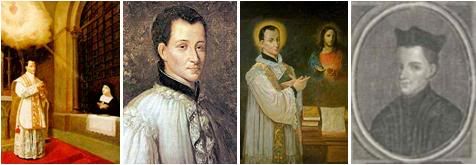 ST. CLAUDE DE LA COLOMBIERE (France, 1641-1682), Jesuit, Preacher, Writer
ST. CLAUDE DE LA COLOMBIERE (France, 1641-1682), Jesuit, Preacher, Writer
Claude was best known before his own beatification and canonization as the spiritual director
who supported St. Margaret Mary Alacoque when she was troubled initially by her visions of the
Sacred Heart, and became, like her, an ardent devotee. Claude had been named rector of the Jesuit
College at Paray le Monial, near the convent of the Sisters of the Visitation to which Margaret
belonged. It is believed the assignment was intended to provide Margaret with the right direction.
Two years later, he was sent to London as court preacher to Mary, Duchess of York (who would
become Queen as the wife of James II). He continued guiding Margaret Mary by letter, and counseled
many Anglicans who wanted to return to the Church. Then, he found himself accused as a conspirator
in an anti-monarchic plot and was imprisoned. By intercession of King Louis XIV, he was released
and sent back to France. He died two years later. He left a number of books on the spiritual life.
He was beatified in 1929 and canonized in 1992.
Readings for today's Mass:
www.usccb.org/nab/readings/021511.shtml
OR today.
Main papal story is the Holy Father's Angelus mini-homily on Christ's great commandment of love. In the inside pages, Cardinal Piacenza cites Benedict XVI's Magisterium at the conclusion of his lecture on the teachings of the modern Popes on priestly celibacy given in Ars earlier. Page 1 international news: China officially surpassed Japan in 2010 to be the world's second largest economy after the USA; the Egyptian interim leadership council dissolves Parliament and announces it will amend the Constitution to make it more democratic in preparation for the country's first elections after President Mubarak's ouster; the Palestinian authority announces national and parliamentary elections in September. Other news: The Spanish bishops' conference publishes the first ever official translation of the Bible into Spanish; US bishops support Republican move to oppose federal government funding for abortions; and Rome inaugurates a new exhibition venue at the Fondazione Roma's Palaazo Sciarra with a major exhibit of 140 art masterpieces borrowed from museums around the world which depict "Ancient Rome in the eyes of 17th-century artists".
No events announced for the Holy Father today.
The Vatican has released the official program for the Pope's pastoral visit to Aquileia and Venice on May 7-8.
 - Today is the 80th birthday of Italy's near-legendary Cardinal Camillo Ruini, who remains active in his retirement, as chairman of the Pope's investigative commission on Medjugorje, chairman of the Academic Committee for the Fondazione Joseph Ratzinger/Benedetto XVI of Rome, and chairman of the Italian bishops' Cultural Project which he had established when he was CEI president.
- Today is the 80th birthday of Italy's near-legendary Cardinal Camillo Ruini, who remains active in his retirement, as chairman of the Pope's investigative commission on Medjugorje, chairman of the Academic Committee for the Fondazione Joseph Ratzinger/Benedetto XVI of Rome, and chairman of the Italian bishops' Cultural Project which he had established when he was CEI president.
- The Pope's personal secretary, Mons. Georg Gaenswein, was awarded an honorary doctorate in international relations and communications today by the Universita degli Stranieri of Perugia, where in the late 1980s, he took his diploma in Italian language and culture, after which he was given the professorial chair in Canon Law at Rome's Pontifical University of Santa Croce. Mons. Gaenswein has a doctorate in canon law from the University of Munich. Avvenire published part of his lectio magistralis, on relations between the Church and the Italian state, in today's issue.
- One year ago today, Benedict XVI began a two-day meeting with the 24 members of the Irish bishops' conference to personally discuss their problems relating to sex=abuse cases. One month later, he would write his historic letter to Irish Catholics on how they and the Church should deal with the crisis.
[Modificato da TERESA BENEDETTA 16/02/2012 14:48] |
| |
|
| |
 15/02/2011 16:19 15/02/2011 16:19 |
|
| | | OFFLINE | | Post: 22.138
Post: 4.765 | Registrato il: 28/08/2005
Registrato il: 20/01/2009 | Administratore | Utente Master | |
|
 Cardinal O'Malley to tell Pope
Cardinal O'Malley to tell Pope
that Irish Church is 'near collapse'
from the sex-abuse fallout
By Michael Kelly

DUBLIN. Feb. 14 (CNS) -- Cardinal Sean P. O'Malley reportedly will tell Pope Benedict XVI that the Catholic Church in Ireland is "on the edge" of collapse due to the fallout from clerical abuse scandals.
Cardinal O'Malley is one of several senior prelates charged by Pope Benedict with carrying out an apostolic visitation of the Irish Catholic Church following a series of highly critical judicial reports that revealed abuse by priests and a widespread culture of cover-up for decades among church leaders.
Father Tony Flannery, a leading member of the Association of Catholic Priests, revealed at a conference of laypeople Feb. 12 in the Irish capital that "Cardinal O'Malley told the association the Irish Church had a decade, at most, to avoid falling over the edge and becoming like other European countries where religion is marginal to society."
Father Flannery said Cardinal O'Malley gave a commitment to the priests' association that he would deliver the frank assessment to the Pope in a confidential report to be submitted later this year.
Admitting to being previously skeptical about the apostolic visitation, Father Flannery said that in light of Cardinal O'Malley's undertaking, "there may be some gleam of hope."
Cardinal O'Malley could not be reached for comment.
In a mid-November statement, the Vatican said it would issue a comprehensive summary of the investigations' findings when they are completed.
Father Flannery said that while the association was ready to campaign for radical change, it was apprehensive that it would be viewed as "a new clericalism."
The association, which represents more than 400 of Ireland's 4,500 priests, was formed in 2010. It has proposed a re-evaluation of the Xhurch's teaching on sexuality and the inclusion of women at every level within the church.
The first phase of the visitation should be completed by Easter, and it is likely the visitators will meet with senior officials of the Roman Curia in the spring to discuss what Jesuit Father Federico Lombardi, the Vatican spokesman, described as the next phase of the "path to renewal."
[Modificato da TERESA BENEDETTA 15/02/2011 16:20] |
| |
 15/02/2011 17:21 15/02/2011 17:21 |
|
| | | OFFLINE | | Post: 22.139
Post: 4.766 | Registrato il: 28/08/2005
Registrato il: 20/01/2009 | Administratore | Utente Master | |
|
 It is fascinating that the principal participant in the next WYD would be the 84-year-old Benedict XVI, older than papa Wojtyla was on his last WYD in Toronto... This item from the WYD official site confirms that the Holy Father's meeting yesterday with the Archbishop of Madrid and president of the Spanish boshops' conference would have had to do with preparations for the Pope's visit in August.
Pope gets WYD knapsack
Translated from the WYD site
It is fascinating that the principal participant in the next WYD would be the 84-year-old Benedict XVI, older than papa Wojtyla was on his last WYD in Toronto... This item from the WYD official site confirms that the Holy Father's meeting yesterday with the Archbishop of Madrid and president of the Spanish boshops' conference would have had to do with preparations for the Pope's visit in August.
Pope gets WYD knapsack
Translated from the WYD site

Madrid, Feb. 14 - Last year, the Pope received the WYD 2011 official cap. Yesterday, he received the second typical accessory for the youth event: the knapsack, which is given to every registered participant.
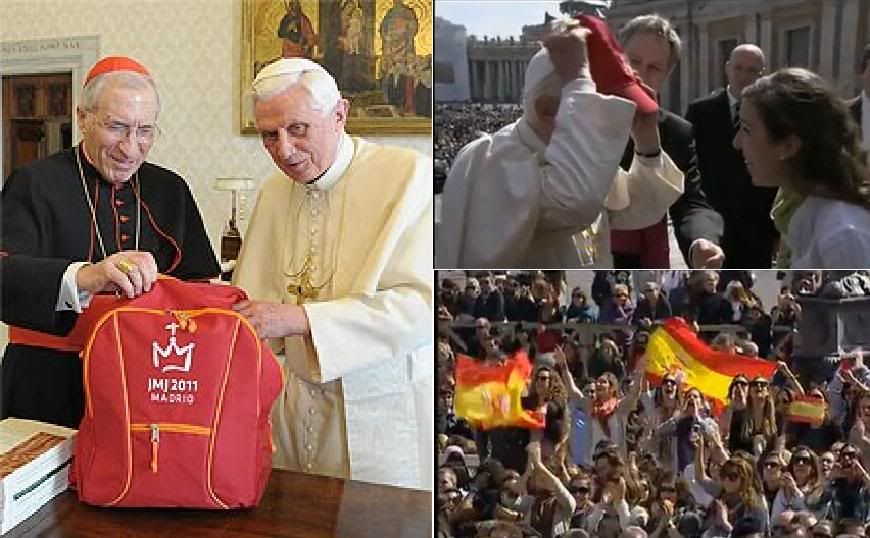
This year, it contains a rosary, a pilgrim's guidebook, a guide to WYD events, the YOUCAT (Youth Catechism) specially prepared for this WYD, a travel card that will enable them to use any of Madrid's public transports, a cap and a fan.
Registered participants will also have free access to all the cultural events related to WYD, priority access to WYD events themselves, and an insurance against accidents valid for the duration of WYD week.
Registrants are invited to help defray travel costs for young people from poorer nations by adding 10 euros to their registration fee.
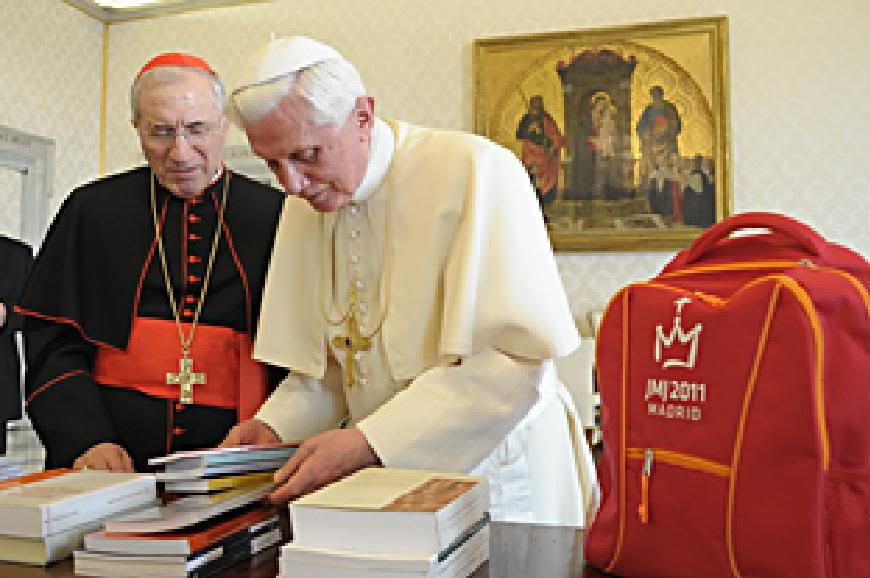 The thick books given to the Pope seem to include the new Bible in its first-ever official translation to Spanish, under the auspices of the Spanish bishops' conference.
Six-month countdown
The thick books given to the Pope seem to include the new Bible in its first-ever official translation to Spanish, under the auspices of the Spanish bishops' conference.
Six-month countdown
to WYD begins today
Translated from the WYD site


MADRID, Feb. 15 - The countdown to WYD 2011 crosses the six-month threshold today.

More than 260,000 persons have registered so far from more than 100 countries in the five continents. On Augusg 15, tens of thousands of young people will arrive in Madrid to begin an unforgettable week which will include four days with Pope Benedict XVI.
This week, the official website will provide more details on the smaller encounters to be held by the Pope such as those with seminarians, with young university professors adn with the WYD volunteers. This last is a new WYD feature which the Pope inaugurated at the end of his visit to Sydney for WYD 2008.
The final auditions for the WYD choir and orchestra will aso be held this week.
Accommodations are already being prepared for pilgrims, who cannot afford hotels. Many of them will stay with families in Madrid. Some 1, 200 families have already offered to welcome as many as 3,800 guests into their homes for WYD week.
The parishes of Madrid are at the center of the drive to recruit host families. In addition, there are 1,800 buildings (public and private schools, gymnasiums and sports centers, parish buildings) which will be available for lodging, most of them city and national institutions.
These include 479 educational centers and 72 sports centers, 50 private colleges, and 172 religious houses. Eighty percent of Madrid's 709 parishes are also providing free lodging spaces.
[Modificato da TERESA BENEDETTA 16/02/2011 12:03] |
| |
 15/02/2011 18:37 15/02/2011 18:37 |
|
| | | OFFLINE | | Post: 22.140
Post: 4.767 | Registrato il: 28/08/2005
Registrato il: 20/01/2009 | Administratore | Utente Master | |
|
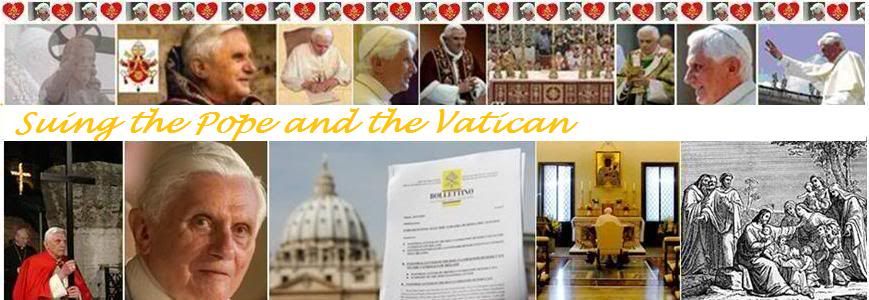 American lawyer Jeffrey Anderson, who has made a career in headline grabbing by trying to sue the Vatican and the Church for all he thinks he can get in damages from US courts for sex abuses committed by priests against minors, has extended his lack of scruples to an unprecedented attack on the Archbishop of New York and current president of the United States Conference of Catholic Bishops. This has constrained Abp. Dolan to reply in his diocesan blog:
Jeffrey Anderson's
American lawyer Jeffrey Anderson, who has made a career in headline grabbing by trying to sue the Vatican and the Church for all he thinks he can get in damages from US courts for sex abuses committed by priests against minors, has extended his lack of scruples to an unprecedented attack on the Archbishop of New York and current president of the United States Conference of Catholic Bishops. This has constrained Abp. Dolan to reply in his diocesan blog:
Jeffrey Anderson's
groundless gossip
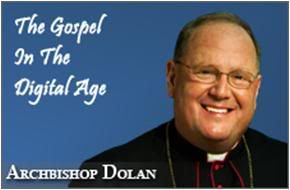
February 14, 2011
I owe it to all of you — both the Catholic and wider community — to be very clear about the ridiculous and groundless gossip spread about me by a tort lawyer named Jeff Anderson.
You may have heard this man claim that, when I was Archbishop of Milwaukee, I “hid’ $130 million of archdiocesan funds so victims of clergy sexual abuse could not sue for it.
Malarkey! The Archdiocese of Milwaukee has an excellent record of fiscal integrity and transparency. I worked hard at that, and my successor, Archbishop Listecki, continues to do so.
(By the way, you might also be interested to know that during my years as Archbishop of Milwaukee, and with the generous service of many dedicated people, we established a mediation process that reached settlements with almost 200 victim survivors; that mediation process has been praised by the victim survivors who have participated in the process.)
In my seven years there, the meager resources of the archdiocese were under the vigilance of a sound and respected finance council, composed of prominent and respected business leaders from the financial community; annually we were audited; and each year there was complete, published financial disclosure. You can find the audited financial statements here.
www.archmil.org/Resources/ArchdioceseofMilwaukeeAuditedFinancialStatem...
To claim that, given this rigorous supervision, an archbishop could have “hidden” $130 million, is beyond ridiculous.
I do want you to know that, when I arrived as archbishop, the financials showed that parishes had $70 million of their peoples’ money on deposit with the archdiocese. This was not archdiocesan money at all, but belonged to parishes.
That’s why the finance council, and our outside professional auditors, advised me that it was inappropriate for the archdiocese to hold money for parishes, and that it should be returned to the parishes to which it belonged anyway. This was done, and publicly reported in the annual audit.
So much for “hidden funds.” Far from inappropriate, this decision was virtuous, open, and in accord with the clear directives of the professionals on our finance council and outside auditors.
The archdiocese of Milwaukee has issued an enlightening statement speculating that this lawyer’s reckless charges also included “hiding” the “cemetery fund,” which, of course, by state law, is scrupulously protected, and cannot be touched or transferred by anybody.
So, these silly charges are baloney. Unfortunately, this man got the attention he wanted and has come to expect from the news, tarnishing the good name of the Archdiocese of Milwaukee, and of me. Some of our priests reported that people at Sunday Mass asked them “Why did Archbishop Dolan hide those funds?”
Lord knows I’ve made mistakes, but “hiding” $130 million is hardly one of them!
P.S. The Catholic League issued a statement on this matter today.
An unseemly attack
on Archbishop Dolan

February 14, 2011
Catholic League president Bill Donohue defended New York Archbishop Timothy Dolan today:
Jeffrey Anderson, who has made a killing suing the Catholic Church, is angry there isn't more money in the Milwaukee Archdiocese for him to milk.
Now he is pointing his finger at the one Milwaukee archbishop who did more to render justice than any of his predecessors, Timothy Dolan (he headed the Milwaukee Archdiocese from 2002-2009).
Anderson wants to know why the Milwaukee Archdiocese moved $75 million to the parishes in 2004. Because it was held as an investment account for the parishes and was returned to them. That's why.
If this is illegal, then Anderson will need an army of lawyers: huge transfers of funds take place every day in religious and secular institutions. Only those with base motives just assume wrongdoing.
Anderson also wants to know why $55 million was moved to a cemetery trust in 2008, a year after a Wisconsin court said victims could sue for fraud. Actually, the cemetery transfer took place in 2007, and was entirely consistent with previous practices: the cemetery trust existed, de facto, since the early 1900s and was not formalized until 2007.
Assisting Anderson in this witch hunt is Los Angeles lawyer, Gillian Brown. She is cut from the same cloth: on Friday, she got so out of hand in her rambling attacks that presiding Assistant U.S. Trustee, David Asbach, had to put the arm on her.
As if we needed any further proof of the vindictiveness at play, Brown asked about the monetary value of the bishops' rings and crosses. This is exactly the kind of shakedown we would expect from the likes of Anderson and Brown.
SNAP, the professional victims' group, is salivating again. And no wonder: their latest 990 tax return shows they're in big trouble —their revenues are plummeting and they're operating in the red. So they badly need Anderson to grease them again. They are incapable of being shamed.
Obviously, the enemy is relentless and totally unscrupulous.,,, Perhaps all those journalists who have spent the past year trying their darndest to find a 'smoking gun' that would blast Joseph Ratzinger/Benedict XVI's reputation to smithereens, should spend some time instead finding out and reporting how these attorneys have shared in and disposed of all the mega-millions they have collected so far in damages in behalf of victims.
And the equally unscrupulous priests who caused all this in the first place will probably never do enough penance to make up for all the harm they have caused - to their victims, to the Church and to themselves.
And why is SNAP in the red? Aren't they given any percentage at all by the attorneys who exploit them for their selfish purposes, from all the damages they have collected all these years? Apparently not. And yet, both sides are in the evil grip of a morbid and mutually exploitative relationship that brings out the worst in human beings - the insatiable greed for money and/or headlines, and unrelentingly malicious vindictiveness.
 |
| |
 16/02/2011 01:17 16/02/2011 01:17 |
|
| | | OFFLINE | | Post: 22.142
Post: 4.769 | Registrato il: 28/08/2005
Registrato il: 20/01/2009 | Administratore | Utente Master | |
|
 I finally found a fairly clean English translation of the KIRCHE 2011 memorandum, from a group blog called PRAYTELL, and much as I dislike having anything more to do with this letter - which I find even more unpleasant, unbelievably banal, ultra-hypocritical, shamelessly fallacy-ridden, and outrageous than I did the first time I read it - I shall post it for the record anyway and you can judge for yourself.
I finally found a fairly clean English translation of the KIRCHE 2011 memorandum, from a group blog called PRAYTELL, and much as I dislike having anything more to do with this letter - which I find even more unpleasant, unbelievably banal, ultra-hypocritical, shamelessly fallacy-ridden, and outrageous than I did the first time I read it - I shall post it for the record anyway and you can judge for yourself.
If this memorandum is any indication, I shudder at the shoddy theology they must teach! Perhaps the worst insult is that they dare present such an ill-conceived and badly executed manifesto to a master of systematic reason and elegant prose as Benedict XVI, to whom this manifesto is really addressed, if the signatories were more honest and less cowardly!
I won't bother to fisk it in detail as it deserves to be, but have 'purpled' its most outrageous passages, and interposed quite a few comments despite myself!
Also, about the translation: The Italian journalists have translated 'Aufbruch' as 'svolta' - which means a turning-point; while this English translation translates it as 'departure'. From the beginning, I chose to translate it as 'new beginning' or 'new start', from among the many possible translations, which also includes 'upheaval'. I think the sense in which the theologians use it is obvious - the same sense by which they and their fellow progressivists considered Vatican II as a 'new start' for the Church. The awkwardness of translating it as 'departure' becomes evident in the many ways the term turns up in the document, even if twice the translator rightly uses the term 'new beginning'.
The Church in 2011:
A Necessary Departure
It is over a year since cases of sexual abuse of children and youth by priests and religious at the Canisius School in Berlin were made public. Thereupon followed a year that plunged the Catholic Church in Germany into an unequaled crisis.
Today, a split image is projected. Much has been undertaken to do justice to the victims, to come to terms with the wrong done, and to search out the causes of abuse, cover-up, and double standards within the Church’s own ranks.
Many responsible Christians, women and men, in office and unofficially, have come to realize, after their initial disgust, that deep-reaching reforms are necessary.
The appeal for an open dialogue on structures of power and communication, the form of official church offices, and the participation of the faithful in taking responsibility for morality and sexuality have aroused expectations, but also fears. [ A re-statement of the relativistic core belief that each individual has the sole prerogative alone to decide what is good or bad!] This might be the last chance for departure from paralysis and resignation. [Sniff! Such melodrama!]
Will this chance be missed by sitting out or minimizing the crisis? Not everyone is threatened by the unrest of an open dialogue without taboos – especially since the papal visit will soon take place. [There's the giveaway of the raison d'etre for this Memorandum!] The alternative simply cannot be accepted: the “rest of the dead” because the last hopes have been destroyed. [More melodrama!]
The deep crisis of our Church demands that we address even those problems which, at first glance, do not have anything directly to do with the abuse scandal and its decades-long cover-up.
As theology professors, women and men, we can keep silence no longer. We consider ourselves responsible for contributing to a true new beginning: 2011 must be a Year of Departure for the Church.
In the past year, more Christians than ever before have withdrawn from the Catholic Church. They have officially terminated their legal membership, or they have privatized their spiritual life in order to protect it from the institution.[Baloney! In Germany, these types simply took advantage of the 'scandal' as a 'radical chic' pretext to pull out so they can stop paying a tax for the Catholic Church!] The Church must understand these signs and pull itself from ossified structures in order to recover new vitality and credibility.
The renewal of church structures will succeed, not with anxious withdrawal from society, but only with the courage for self-criticism and the acceptance of critical impulses – including those from the outside. [The Church does not have to listen to external sources to take care of its internal problems. She has a dynamic that is not simply human-driven!]
This is one of the lessons of the last year: the abuse crisis would not have been dealt with so decisively without the critical accompaniment of the larger public. [Excuse me????? What help was the 'public' which did nothing but dismiss the Church and her leaders with scorn and contempt?]
Only through open communication can the Church win back trust. The Church will become credible when only its image of itself is not removed so far from the image others have of the Church. [That is downright ludicrous - when the image 'others' have of the Church is that it is nothing more than a cradle of evil, a confederacy of dunces.]
We turn to all those who have not yet given up hope for a new beginning in the Church and who work for this. We build upon the signals of departure and dialogue which some bishops have given in recent months in speeches, homilies, and interviews.
The Church does not exist for its own sake.[Wow! What a pearl of wisdom! What thesaurus of platitudes did these theologians raid to cobble this memorandum?] The church has the mission to announce the liberating and loving God of Jesus Christ to all people. The Church can do this only when it is itself a place and a credible witness of the good news of the Gospel. [DUH! You're reminding Benedict XVI of this? And do you, dissenting theologians, consider yourselves 'credible' witnesses of the Gospel????]
The Church’s speaking and acting, its rules and structures – its entire engagement with people within and outside the Church – is under the standard of acknowledging and promoting the freedom of people as God’s creation.
Absolute respect for every person, regard for freedom of conscience, commitment to justice and rights, solidarity with the poor and oppressed: these are the theological foundational standards which arise from the Church’s obligation to the Gospel. Through these, love of God and neighbor become tangible. [DUH once again! I would refer these theologians to Benedict XVI's mini-homily last Sunday for a truly elegant and memorable statement of these basic tenets!]
Finding our orientation in the biblical Good News implies a differentiated relationship to modern society. When it comes to acknowledgement of each person’s freedom, maturity, and responsibility, modern society surpasses the Church in many respects. [Another reaffirmation of relativism. 'Acknowledgment of each person's etc...' is code for "Each person can and should do as he pleases".]
As the Second Vatican Council emphasized, the Church can learn from this. In other respects, critique of modern society from the spirit of the Gospel is indispensable, as when people are judged only by their productivity, when mutual solidarity disintegrates, or when the dignity of the person is violated.
This holds true in every case: the Good News of the Gospel is the standard for a credible Church, for its action and its presence in society. The concrete demands which the Church must face are by no means new. And yet, we see hardly any trace of reform-oriented reforms. [How can reforms not be reform-oriented? What they mean is that they do not consider any changes carried out by Benedict XVI to be reform, because, to them, he is 'conservative and traditionalist' and therefore incapable of reform.]
Open dialogue on these questions must take place in the following spheres of action. [So, go ahead and dialog with anyone who will engage you! Of course, it is really Benedict XVI that they are challenging directly to this 'open dialog'. All they have to do is read through what he has said and written since he became Pope - and they will find he has answered all their demands ten times over. Just that his answers are not what they want to hear. It is almost insulting how they frame their demands as though the Pope as leader of the Church had never ever once considered these very questions and patiently explained why the Church does as she does about them! Come to think of it, their ultimate isult to the Pope is probably not to read anything he writes or says at all, so they would have no way of knowing!]
1. Structures of Participation: In all areas of church life, participation of the faithful is a touchstone for the credibility of the Good News of the Gospel. According to the old legal principle “What applies to all should be decided by all,” more synodal structures are needed at all levels of the Church. [The age-old fallacy of liberals is to think that the Church has to be a democracy as in a political state. The Church is not a human institution because though she is carried on by humans, she was divinely instituted. And no true religion can be a democracy, because religion - faith - implies a basic discipline, and discipline in faith means obedience by everyone, a virtue the liberals do not recognize at all, but is fundamental to the truly faithful. Once again, they should consider the Pope's homilies reflecting on the elements of the first Christian community of Jerusalem - there was prayer, there was communion, there was sharing, but there was, first of all, 'listening to the Apostles' who transmitted the Word of Christ. Listening in religion means obedience. Unless there is obedience, you have not listened, you remain self-centered and self-absorbed, incapable of humility. But this too is a virtue one does not expect to find in these breastbeating pharisaic theologians!] The faithful should be involved in the naming of important officials (bishop, pastor). Whatever can be decided locally should be decided there. Decisions must be transparent.
2. Community: Christian communities should be places where people share spiritual and material goods with one another. But community life is eroding presently. Under the pressure of the priesthood shortage, larger and larger administrative entities (Size “Extra Large” Parishes) are constructed in which neighborliness and sense of belonging can hardly be experienced anymore. Historical identity and built-up social networks are given up. Priests are “overheated” and burn out. The faithful stay away when they are not trusted to share responsibility and to participate in democratic structures in the leadership of their communities. Church office must serve the life of communities – not the other way around. The Church also needs married priests and women in church ministry. [What senseless blather! Especially coming from theologians who are confined to their academic lecture halls and probably never had any pastoral experience at all.]
3. Legal culture: Acknowledgement of the dignity and freedom of every person is shown when conflicts are borne fairly and with mutual respect. Canon law deserves its name only when the faithful can truly make use of their rights. It is urgent that the protection of rights and legal culture be improved. A first step is the development of administrative justice in the Church. [More senseless blather! Can't they learn to say things directly and not speak in code?]
4. Freedom of Conscience: Respect for individual conscience means placing trust in people’s ability to make decisions and carry responsibility. ['Respect for individual conscience' is of course the more familiar liberal code for 'Each person is free to do as he pleases when he pleases'. They should all read Blessed John Henry to get the right ideas about conscience!] It is the task of the Church to support this capability. [No, it is not. It is the task of the Church to form Catholic consciences which can discern not just right from wrong but judges events and situations by the standards of the Church.] The Church must not revert to paternalism. Serious work needs to be done especially in the realm of personal life decisions and individual manners of life. [[Once again, the insistence on 'Each man can and should decide for himself as he pleases, when he pleases". SOOOOOOO TIRESOME AND ANNOYING ALREADY!]
The Church’s esteem for marriage and unmarried forms of life [?????] goes without saying. But this does not require that we exclude people who responsibly live out love, faithfulness, and mutual care in same-sex partnerships or in a remarriage after divorce. [The Church does not 'exclude' anyone. She does points out occasions and situations of sin, such as homosexual activity and divorce, but the liberals would want the Church to change her teaching about that! I'd say they can't be serious!, but they are about this. Once again, they should listen to the Holy Father's homily to the new bishops about 'marsh reeds that bend with the wind', that grow on shifting sands and cannot take root in rock.]
5. Reconciliation: Solidarity with “sinners” presupposes that we take seriously the sin within our own ranks. [They're saying this to Benedict XVI, who instinctively and immediately indicated the path of purification and witness as the necessary first step for renewal????] Self-justified moral rigorism ill befits the Church. The Church cannot preach reconciliation with God if it does not create by its own actions the conditions for reconciliation with those before whom the Church is guilty: by violence, by withholding rights, by turning the biblical Good News into a rigorous morality without mercy. [When was the last time anyone ever accused the Church of hell-and-brimstone moralism??? In fact, it seems most priests and bishops have abdicated from preaching about sin at all - Benedict XVI memorably lamented early in his pontificate that the faithful seem to have lost the sense of sin!]
6. Worship: The liturgy lives from the active participation of all the faithful. Experiences and forms of expression of the present day must have their place. Worship services must not become frozen in traditionalism. [Guys, you have your Novus Ordo, which remains the ordinary form of the Mass. You think that is 'frozen in traditionalism'????] Cultural diversity enriches liturgical life, but the tendency toward centralized uniformity is in tension with this. Only when the celebration of faith takes account of concrete life situations will the Church’s message reach people. [Obviously, these theologians have lost all sense of worship as rite and ritual. A rite is a prescribed set of actions and words - by nature, it cannot be free-form, 'creative' and continually changing. For 1,970 years, Catholics the world over uncomplainingly celebrated the Latin rite with some degree of universal uniformity as it was handed down from generation to generation. All of a sudden they demand cultural diversity? I don't think anyone would have even thought of 'inculturation' if the Bugnini liturgists and kumbaya theologians had not introduced the idea at all!]
The already-begun dialogue process in the Church can lead to liberation and departure when all participants are ready to take up the pressing questions.
We must lead the Church out of its crippling preoccupation with itself through a free and fair exchange of arguments and solutions. The tempest of the last year must not be followed by restful quietness!
In the present situation, this could only be the “rest of the dead.” Anxiety has never been a good counselor in times of crisis. [YADA, YADA, YADA! And who is acting like nervous Nellies with this letter? Anxiety is the last thing one could attribute to Benedict XVI!]
Female and male Christians [Why 'female and male' - why not go all the way with lesbians, gay, bisexuals and transgender?] and are compelled by the Gospel to look to the future with courage, and walk on water like Peter as Jesus said to him, “Why do you have fear? Is your faith so weak?” [And how is this quotation relevant at all to their message? Who is showing fear here? And whose faith is being weak?]
YUKKKK!
P.S. Catholic News Agency has finally come up with its first report on the 'memorandum'and surveys its main points as well as the principal reactions to it so far:
German bishops see recycled ideas
in theologians' 'reform' letter
By Benjamin Mann

Bonn, Germany, Feb 16, 2011 (CNA) - Increasing numbers of European theologians have signed onto a set of proposals they say will “renew” the struggling German Church.
But while the German bishops say they are willing to hold discussions, they have indicated that the proposal re-treads old ground and contradicts important Catholic convictions.
As of Feb. 15, 227 theologians from three German-speaking countries had signed their names to a letter entitled “The Church in 2011: A necessary departure,” which was first endorsed by 143 signatories on Feb. 3.
Issues of sexuality, authority, and cultural adaptation dominated the statement, which used revelations of sexual abuse at Berlin's Canisius school – revealed in early 2010, approximately three decades after they occurred – as the jumping-off point for a series of wide-ranging proposals.
“The deep crisis of our Church,” the theologians wrote, “demands that we address even those problems which, at first glance, do not have anything directly to do with the abuse scandal and its decades-long cover-up.” Many German Catholics, they said, have come to believe that “deep-reaching reforms are necessary.”
The theologians' program of “reform” would involve greater lay participation in selecting bishops and pastors, increased tolerance for different styles of liturgical worship, and a decisive break with what they described as attitudes of “paternalism” and “moral rigorism.”
More specifically, the theologians asserted that “the Church also needs married priests and women in church ministry.”
For this reason, the letter has been regarded in the international media as a call for an “end to celibacy.” The text itself, however, only indicated a preference for making the Latin rite practice of priestly celibacy optional, rather than mandatory. [That is not at all indicated in the text!]
Although some interpreters regarded the statement on women in ministry as a call for women's ordination, it was not clear whether the statement carried this meaning, or merely acknowledged the important roles women have always played in the life of the Church. [What's to make clear? "The Church needs... women in Church ministry" means just that. The headlines were unfair that took this to mean the dissenters necessarily meant women priests, but church ministry also includes deacons, who require training and ordination like priests - it is the step before priesthood - as well as unordained ministers.]
They went on to state that “the Church's esteem for marriage … does not require that we exclude people who responsibly live out love, faithfulness, and mutual care in same-sex partnerships or in a remarriage after divorce.”
Referring to German Catholics' declining participation in Church life, the theologians indicated that the answer lay in modifying the Church's approach so that it agrees more with the surrounding culture.
“When it comes to acknowledgment of each person's freedom, maturity, and responsibility, modern society surpasses the Church in many respects,” they wrote. “As the Second Vatican Council emphasized, the Church can learn from this.”
The theologians did not indicate which portion of the Vatican II documents they were referring to, in advancing this claim.
Fr. Hans Langendörfer, secretary for the German bishops' conference, responded to the letter on their behalf on Feb. 8. He expressed appreciation for the theologians' engagement with the state of the German Church, acknowledging that they had raised “weighty issues” that should “no longer be avoided.”
But Fr. Langendörfer noted that the proposals had been made with some frequency in the past.
“In essence,” he said, “the memorandum gathers once again ideas already often debated.” Many of these ideas, he said, were “in disagreement with the theological convictions and statements of the Church at the highest level.”
Fr. Langendörfer said that the next meeting of the German Bishops' Conference would seek to respond to the theologians' concerns, in cases where “urgent further clarification” was needed.
German Cardinal Walter Kasper, president emeritus of the Pontifical Council for the Promotion of Christian Unity, responded to the theologians' letter by highlighting the importance of celibacy. In a Feb. 6 homily at the Church of Santa Maria dell’Anima in Rome, he described celibacy as a “sign that exists for Christ and for the Kingdom of God.”
The cardinal referred to the gospel passage which says Christians should be the “salt of the earth” and said that celibacy “is that pinch of salt that not everyone can be, but that brings good to all.”
Peter Seewald, the German journalist who recently collaborated with Pope Benedict XVI on the book “Light of the World,” was less restrained in his own comments on the theologians' manifesto.
Seewald told the German website Kath.net that the open letter was “a rebellion in the nursing home,” orchestrated by “chief priests of the zeitgeist” whose priority was to accommodate public opinion.
John Allen has now blogged on the issue, rather perfunctorily, skirting the questions raised to give undue importance to what Fr. Landendoerfer said, but he conducted an interview with one of the signatories. You may check on it here:
www.ncronline.org/blogs/ncr-today/german-bishops-express-desire-dialogue-their-the...
[Modificato da TERESA BENEDETTA 16/02/2011 15:09] |
| |
 16/02/2011 10:56 16/02/2011 10:56 |
|
| | | OFFLINE | Post: 365
Post: 88 | Registrato il: 28/05/2007
Registrato il: 19/02/2009 | Utente Comunità | Utente Junior | |
|
This is turning into an all out war between traditional and de-facto protestant fractions of Catholicism in Germany.
-> A counter Memorandum has been published and has been signed by thousands of people. Please see here and sign if you can – I already did: petitionproecclesia.wordpress.com/27-2/
-> Card. Kasper (of all people) has issued another statement, forcefully arguing against the silly requests and the demanding, nearly spiteful way there were made.
-> Some teachers of religion class (mandatory) have supported the Memorandum by the renegade theologians.
-> In response, the ‘Forum of German Catholics’, a more traditional group, has instructed parents to pull their children out of religion class, because the children are taught dissent and heresy.
-> Church from below is jumping for joy and they’re gearing up to throw all of that rubbish at the Holy Father in September.
-> The Bishops in general have been cowardly silent – except for the usual strongholds
-> Conspiracy theories are going around, involving the spokesperson for the German Bishops Conference, who is allegedly connected to the initiators of the Memorandum.
-> The Theological faculty of Münster (!) seems to be the main breeding ground for dissent – second place: Tübingen. Open letters by Catholics Publishers and even by former theology students have called for a public reprimand by the responsible Bishops and have demanded that the concerned theologians have their teaching permission revoked.
-> The media is loving it. They’ve been inviting the dissenters to talk shows left and right.
-> Some ‘professional Catholics’, employed by the Church have called to turn the visit of the Holy Father into some type of protest march and confrontation with what the faithful demand!
I’m generally not a pessimistic person, but I honestly believe that this will lead to an official schism of the Catholic Church in Germany into a Roman Catholic and a German National Catholic Church.
It’s heartbreaking, really.
But it may be a needed cut to actually regain authenticity, to remain an offense in our hedonistic, quickly unraveling society.
I guess only time will tell. We do need some serious prayers.
 I can understand your horror - and this is just the kind of reaction that those dissidents wanted to provoke. However, very much from the outside looking on, I don't think any of the German dissident bishops has the balls or the leadership to break away and lead a schismatic German Church, though the dissidents may get some parish priests - and if the theologians create their own bishops, they'll be no better than the Lefebvrians. Also, 'German National Catholic Church' is too reminiscent of the German National Church that the Nazis set up...
I can understand your horror - and this is just the kind of reaction that those dissidents wanted to provoke. However, very much from the outside looking on, I don't think any of the German dissident bishops has the balls or the leadership to break away and lead a schismatic German Church, though the dissidents may get some parish priests - and if the theologians create their own bishops, they'll be no better than the Lefebvrians. Also, 'German National Catholic Church' is too reminiscent of the German National Church that the Nazis set up...
And moreover, these dissenters just love to hear themeselves talk and see themselves in the headlines. Do you think they have the initiative and gumption to create a whose structure from scratch? If they did, they would have done so a long time ago. As I commented in an earlier post, Catholic dissident leaders today hardly ever formally break away from the Church because if they do, they will make news for a few days and not be heard from again, because the media is not interested in dissidents outside the Church - and their egos can't bear to lose the headlines!
Meanwhile, this will be a very public test for Zollitsch and the DBK - who, after all, 'invited' the Pope to visit Germany. Do they have the backbone to stand unequivocally behind him? Nothing in their record so far - and certainly, not the questionable statement made by that Jesuit priest for the DBK, nor the DBK secretary's reported involvement in teh dissident plot - leads us to hope for any such courage and decisiveness!... I am grateful that Cardinal Kasper - who made some disturbingr remarks after the Williamson case - came out on the right side this time, and quite forcefully, on both the hateful, almost sub-literate Memorandum, and about the 1970 letter on priestly celibacy...
Do you suppose Cardinal Lehmann might think of himself as the new Martin Luther and come out as the highest-ranking dissident to lead all these 'We are church' types into a 'mini-me' Reformation on the 500th anniversary of Luther's Reformation?... Where Luther used the practice of simony as his take-off for questioning a whole range of Roman Catholic doctrine and practices, these current dissidents are using the sex abuse scandals... Will they rob the headlines from the Pope in September by nailing their Memorandum on the doors of the Gedaechtniskirche in Berlin to formalize their schism?
What is Cardinal Marx doing to lead a counter-action against the dissidents? it's the least he can do for the Pope and the Church. He has the youth and energy that Cardinal Meisner does not have. And Bishop Mueller of Regensburg does not have the rank...
Yes, we must all pray for all German Catholics and the Catholic Church in Germany.
TERESA
[Modificato da TERESA BENEDETTA 16/02/2011 12:42] |
| |
 16/02/2011 14:34 16/02/2011 14:34 |
|
| | | OFFLINE | | Post: 22.143
Post: 4.770 | Registrato il: 28/08/2005
Registrato il: 20/01/2009 | Administratore | Utente Master | |
|
 OR, Avvenire, Vatican Radio and the Italian newspapers gave ample coverage today to Georg Gaenswein's academic honor yesterday in Perugia and the address he gave, of which both Avvenire and OR have published excerpts, as well as his answers to newsmen's questions afterwards..
OR, Avvenire, Vatican Radio and the Italian newspapers gave ample coverage today to Georg Gaenswein's academic honor yesterday in Perugia and the address he gave, of which both Avvenire and OR have published excerpts, as well as his answers to newsmen's questions afterwards..
Mons. Gaenswein:
'Healthy secularity'
reinforces Italian identity

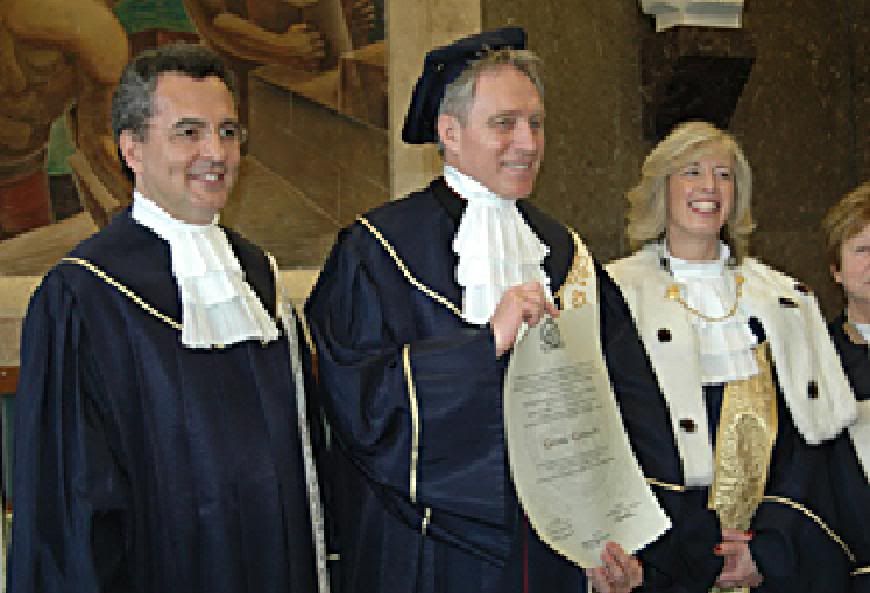
15 FEB 2011 (RV) - Perugia’s University for Foreigners has bestowed an honorary degree in communications systems in international relations on Msgr. Georg Gaenswein, Pope Benedict XVI’s personal secretary.
During the ceremony Tuesday morning, Msgr. Gaenswein gave a lectio magistralis on "Church-State relations in Italy. Libertas Ecclesiae in the Concordat”, in which he underlined that the Church and the State, although for different reasons, are at the "service of the human person and the common good".
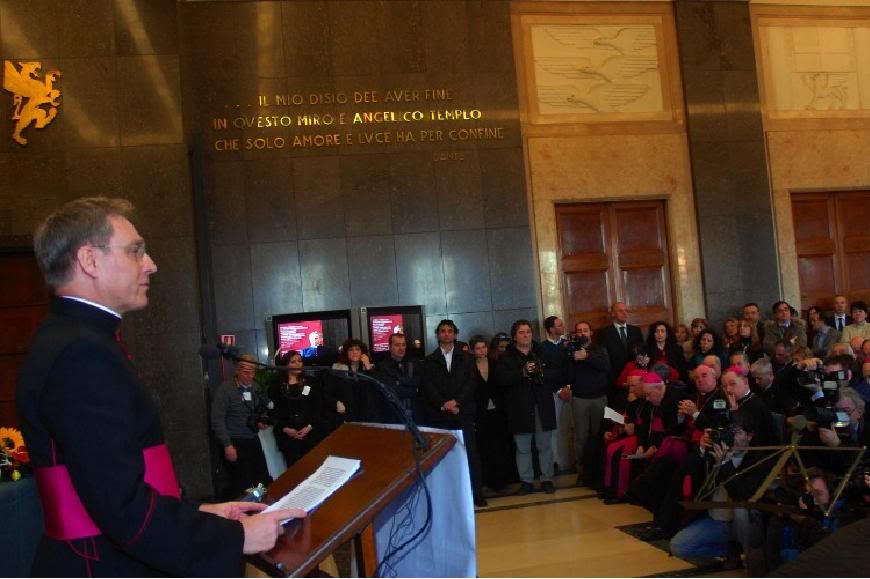
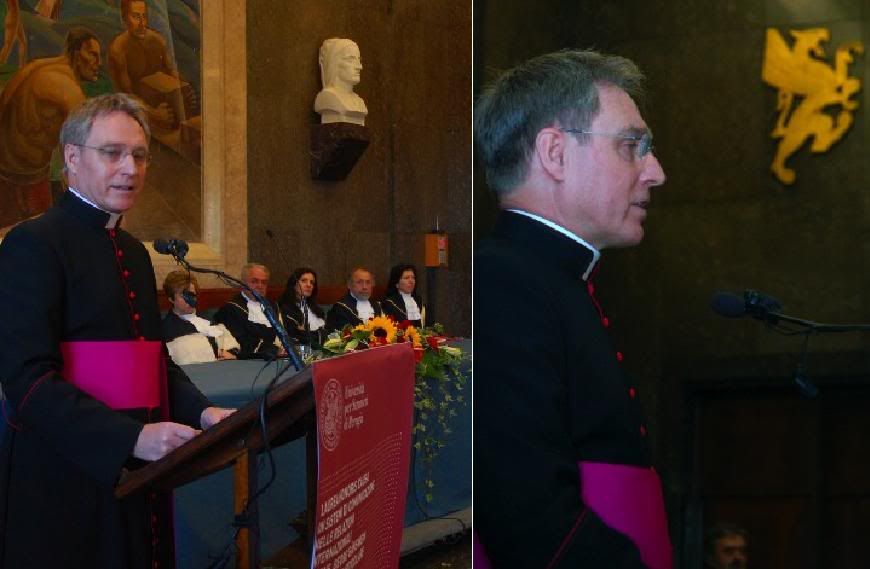
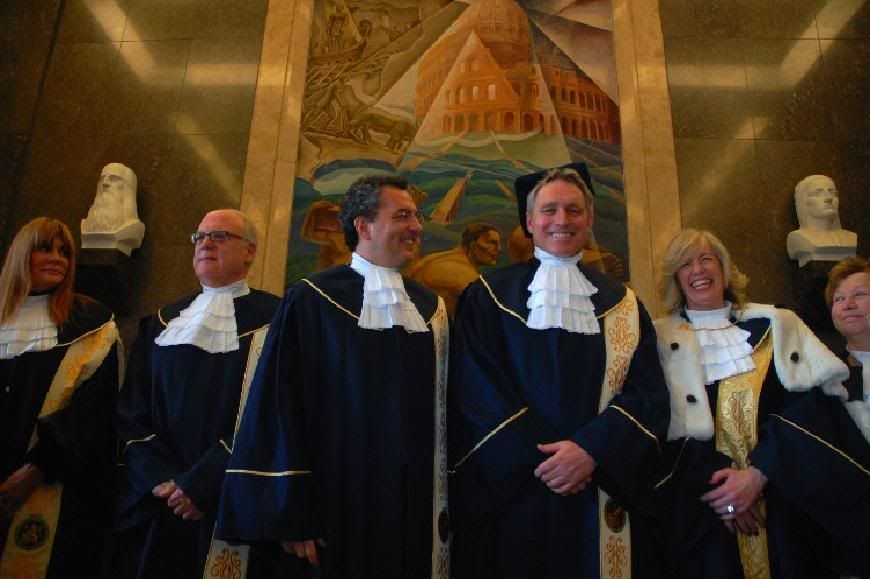
Retracing Church-State relations in Italy from the Lateran Concordat of 1929 to the Villa Madama Agreement that revised it in 1984, the papal secretary noted how the 1984 Agreement affirmed "a new conception of sovereignty, one that is no longer closed but open to serving humanity and the common good", for which "a healthy partnership” is necessary, “even in the diversity of their respective responsibilities".
Msgr Gaenswein recalled the vision of relations between Church and State in Italy proposed by Benedict XVI during his visit to the Quirinal Palace in 2005.
"The autonomy of the temporal sphere," he said, echoing the Pope words, "does not preclude close harmony with the superior and complex requirements arising from an integral vision of man and his eternal destiny."
The Concordat of 1929 and the 1984 agreements, he added, "provide a legal framework for the realisation of a healthy secularism" of which the Pope speaks, and one which "strengthens the identity of Italy."
Msgr Gaenswein devoted a significant portion of his address to the City of Rome, expressing his hopes for the approval of a series of norms that will allow it to best fulfil its role as capital, international city and the seat of Catholicism.
In particular, Mgr. Gaenswein noted that Rome could be fitted with special laws attentive to areas such as international relations, welcoming pilgrims and health and social services for immigrants.
Two recent events, he added, reinforce this view: the Great Jubilee of 2000 and the funeral of Pope John Paul II, which saw a multitude of people flowing into Rome and led authorities to reassess services in many urban areas.

[Modificato da TERESA BENEDETTA 19/02/2011 20:40] |
| |
 16/02/2011 14:35 16/02/2011 14:35 |
|
| | | OFFLINE | | Post: 22.144
Post: 4.771 | Registrato il: 28/08/2005
Registrato il: 20/01/2009 | Administratore | Utente Master | |
|
 Wednesday, February 16, Sixth Week in Ordinary Time
Wednesday, February 16, Sixth Week in Ordinary Time
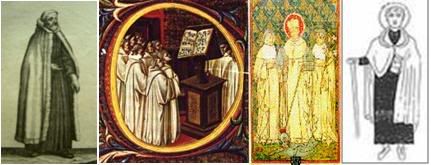 ST. GILBERT OF SEMPRINGHAM (England, 1083-1190)
ST. GILBERT OF SEMPRINGHAM (England, 1083-1190)
Priest, Founder of the Gilbertines
Son of a Norman noble, Gilbert was sent to Paris where he studied theology and returned
to be a clerk with the local bishop. He started a school of children and soon attracted
a small community of men and women aspiring to be religious. Gilbert was personally very
ascetic. When he came into his inheritance, he used it to expand the community and its
work with schools, orphanages and hospitals. In 1130, with the help of St. Bernard of
Clairvaux, he set up the Gilbertine orders, with an eclectic constitution, in which the priests
(canons regular) followed the Augustinian rule, and the nuns and lay brothers and sisters
followed the Cistercian (reformed Benedictine) rule. This was the only English medieval
congregation but it came to an end with the dissolution of monasteries that followed Henry
VII's break from the Catholic Church. The Gilbertines had 26 monasteries at the time. When
he was 80, he was imprisoned on suspicion of having helped Thomas Becket escape to France.
Although Becket did stay in Sempringham and escaped in the guise of a Gilbertine lay brother,
Gilbert did not deny the charges. In his 90s, he was denounced by some of his lay brothers
for being too strict with his Rule, but he was upheld by Alexander III. He died at age 108,
giving rise to an immediate cultus. Many miracles were attributed at his tomb and he was
canonized in 1201, just 12 years after he died.
Readings for today's Mass: www.usccb.org/nab/readings/021611.shtml
OR today.
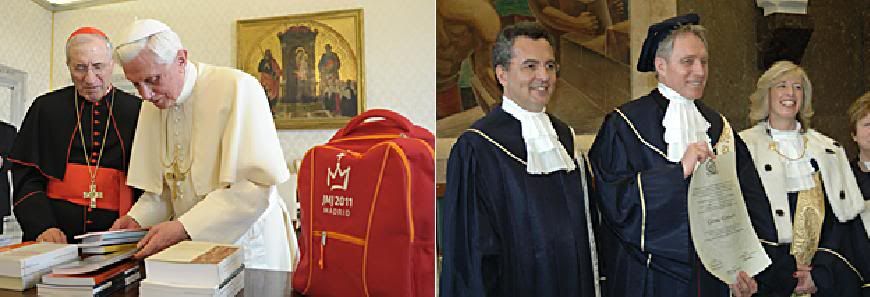 No papal story in this issue except the Pope receiving the official WYD knapsack from Cardinal Rouco Verla of Madrid; and indirectly, Mons. Georg Gaenswein receiving an honorary doctorate from Perugis's Universita per Stranieri, with a major excerpt from his lectio magistralis on the relations between the Church and the Italian State as defined by the Lateran Pacts and its 1984 revision. Page 1 items; An essay about the new Pontifical Council for Promoting New Evangelization, by Cardinal Claudio Hummes, immediate past prefect of the Congregation for the Clergy; the European Union creates an anti-crisis fund, and pledges to give financial assistance to Italy for dealing with North African undocumented immigrants continually arriving by boat along Italy's coastline - expected to be about 80,000 this year; continuing coverage on unrest in the North African and Arab countries following on the successful anti-government popular uprisings in Tunisia and Egypt. In the inside pages, Cardinal Naguib of the Coptic Catholic Church in Egypt sees the developments as positive for Christians; Mexican bishops visit Colombia to learn how their bishops helped tame the violence generated by the drug cartels. Two significant cultural essays: An analogy between the Church today with respect to the new communications technologies, and the Fathers of the Church who had to preserve, defend and promote Christianity in the face of the 'world of spectacle and images' that characterized the Greco-Roman culture of late antiquity[; and a review of a new book on 'The arts of Siena in the early Renaissance, from Jacopo della Quercia to Donatello' at a time when 'the whole world passed through Siena'.
PAPAL EVENTS TODAY
No papal story in this issue except the Pope receiving the official WYD knapsack from Cardinal Rouco Verla of Madrid; and indirectly, Mons. Georg Gaenswein receiving an honorary doctorate from Perugis's Universita per Stranieri, with a major excerpt from his lectio magistralis on the relations between the Church and the Italian State as defined by the Lateran Pacts and its 1984 revision. Page 1 items; An essay about the new Pontifical Council for Promoting New Evangelization, by Cardinal Claudio Hummes, immediate past prefect of the Congregation for the Clergy; the European Union creates an anti-crisis fund, and pledges to give financial assistance to Italy for dealing with North African undocumented immigrants continually arriving by boat along Italy's coastline - expected to be about 80,000 this year; continuing coverage on unrest in the North African and Arab countries following on the successful anti-government popular uprisings in Tunisia and Egypt. In the inside pages, Cardinal Naguib of the Coptic Catholic Church in Egypt sees the developments as positive for Christians; Mexican bishops visit Colombia to learn how their bishops helped tame the violence generated by the drug cartels. Two significant cultural essays: An analogy between the Church today with respect to the new communications technologies, and the Fathers of the Church who had to preserve, defend and promote Christianity in the face of the 'world of spectacle and images' that characterized the Greco-Roman culture of late antiquity[; and a review of a new book on 'The arts of Siena in the early Renaissance, from Jacopo della Quercia to Donatello' at a time when 'the whole world passed through Siena'.
PAPAL EVENTS TODAY
General Audience - The Holy Father's catechesis today was on Spain's great mystic San Juan de la Cruz (John of the Cross, 1542-1591). St. Teresa's collaborator in reforming the Carmelite order, and Doctor of the Church.
[Modificato da TERESA BENEDETTA 16/02/2011 14:38] |
| |
 16/02/2011 17:45 16/02/2011 17:45 |
|
| | | OFFLINE | | Post: 22.145
Post: 4.772 | Registrato il: 28/08/2005
Registrato il: 20/01/2009 | Administratore | Utente Master | |
|
 GENERAL AUDIENCE TODAY
GENERAL AUDIENCE TODAY
Catechesis on St. John of the Cross
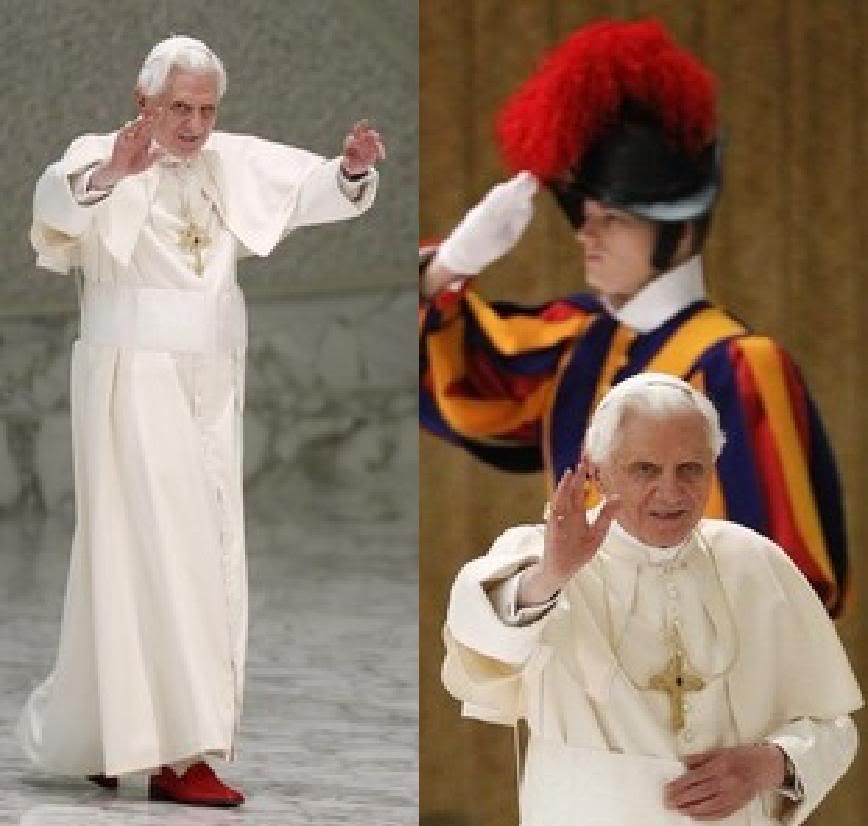 St. John of the Cross:
St. John of the Cross:
'Human effort always
needs God's action'

15 FEB 2011 (RV) - “Human effort is not enough to eradicate bad habits, it can only limit them”, instead “God’s decisive action is needed to purify human beings”, from our “disordered dependence on things”, Pope Benedict XVI said Wednesday as he dedicated his general audience to the figure of 16th Spanish saint, John of the Cross.
Continuing his series of lessons on the doctors of the church, the Pope asked whether "this great saint and mystic, has something to say to us, to every normal Christian” today “Nor is he just a model for a few chosen souls".
To "find an answer," he continued, "we must first understand that John’s life was a very hard, practical and concrete one”, to the point of prison, where "he suffered incredible insult and physical abuse” but where he also wrote “one of his finest works". In short, holiness is not only for a privileged few, but a path to which we all are called.
Born in Fontiveros in 1542 into 'a poor family', the death of his father drove the family to Medina del Campo, where the young John was admitted to Immaculate Conception hospital as a nurse and at 18 years to the Jesuit college. By the end of his formation his vocation to religious life was clear and in 1563 he joined the Carmelites.
Sent to Salamanca University, he was ordained priest in 1567 and returned to Medina del Campo for his first mass. Here his first meeting with St. Teresa of Avila took place, which was "decisive for both”. The two worked together and inaugurated the first home of the Discalced Carmelites on December 28, 1568.
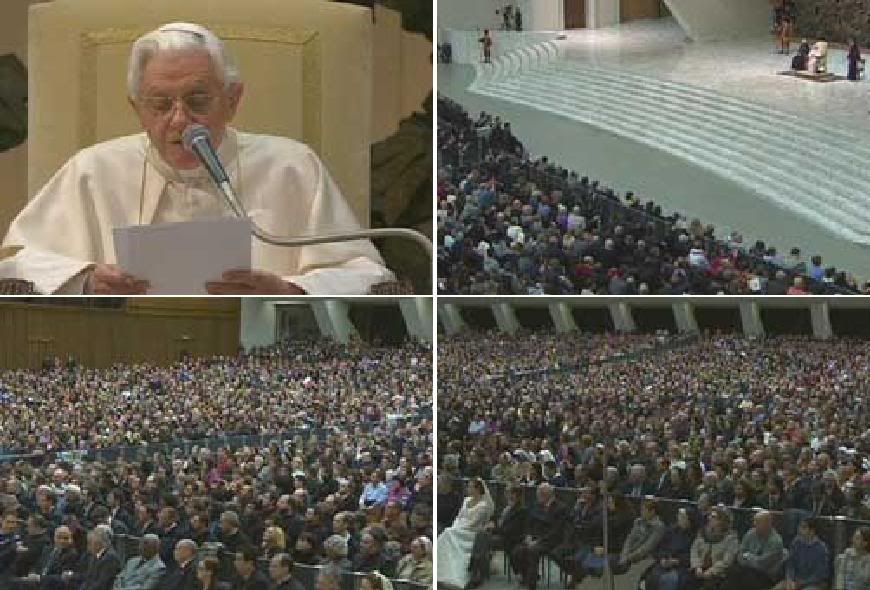 Here he is how he synthesized the catechesis in English:
Here he is how he synthesized the catechesis in English:
In today’s catechesis, we discuss the sixteenth-century Spanish Carmelite mystic, Saint John of the Cross. John was born into a poor family.
As a young man he entered the Carmelites and was ordained priest. Soon afterwards, he met Teresa of Avila in what was a decisive encounter for them both, as they discerned plans for reforming the Carmelite Order.
He became confessor at Teresa’s monastery, and together they developed a rich articulation of the workings of the Lord upon the soul in the spiritual life.
Despite persecution and misunderstanding from within his own Order, John produced some of the most illuminating and insightful treatises in all of Western spirituality. His four major writings are The Ascent of Mount Carmel, The Dark Night of the Soul, The Spiritual Canticle, and The Living Flame of Love.
One of the themes much developed by John was that of the purification of the soul: by means of created things, we can discover traces of the living God in this world.
Faith, however, is the unique means by which we can come to know God as he is in himself. The demanding process of purification, at times active and at others passive, requires our determined effort, but it is God who is the real centre; all man can do is dispose himself and humble himself before the loving work of God in the soul.
In this sense, John is for us a model of humble dedication and of faithful perseverance on the road to spiritual maturity.
[ 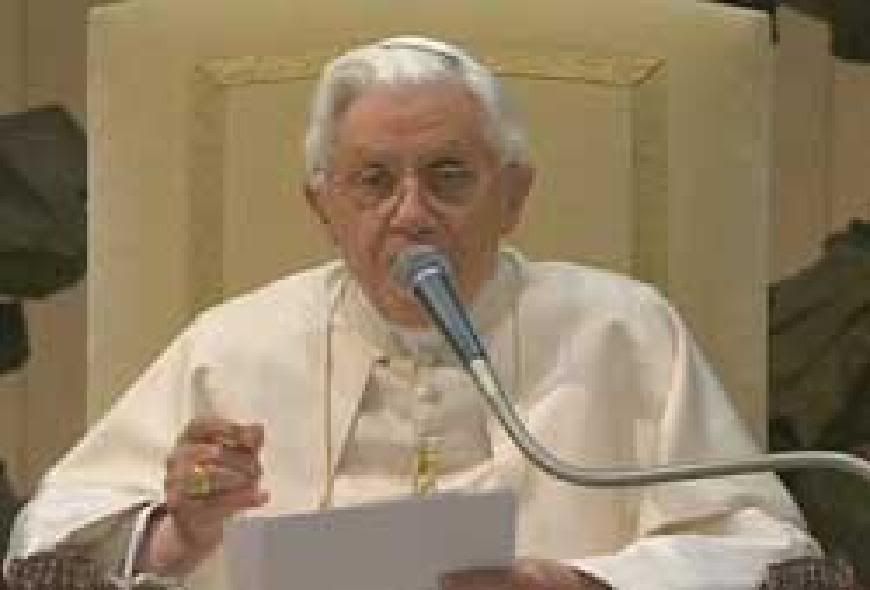 Here is a full translation of the catechesis:
Here is a full translation of the catechesis:
]
Dear brothers and sisters,
Two weeks ago, I presented the figure of the great Spanish mystic
Teresa de Jesus (Teresa of Avila). Today, I wish to speak of another important saint of those lands, who was the spiritual friend of St. Teresa, and co-reformer with her of the Carmelite religious family.
St Juan de la Cruz (John of the Cross) was proclaimed Doctor of the Church by Pope Pius XI in 1926, and has traditionally been called Doctor mysticus, doctor of mystical theology.
Juan de la Cruz was born in 1542 in the small village of Fontiverde, near Avila, in old Castile, to Gonzalo de Yepes and Catalina Alvarez. The family was very poor because the father, from a noble family of Toledo, had been chased out of the family and disinherited when he married Catalina, a humble silk weaver.
Orphaned of his father as a boy, Juan [his baptismal name] at age 8 moved with his mother and brother Francisco to Medina del Campo, near Valladolid, which was a commercial and cultural center. He attended the Colegio de los Doctrinos while carrying out humble tasks for the sisters of the church-convent of La Magdalena.
Later, thanks to his personal qualities and excellence in studies, he was admitted first as a nurse at the Hospital of the Conception, then to the Jesuit College which had just been established in Medina del Campo.
He was 18, and for three years, he studied human sciences, rhetoric and the classical languages. At the end of this formation, he was clear about his own vocation: religious life. Among the many orders present in Medina, he felt called to join the Carmelites.
In the summer of 1563, he began his novitiate with the Carmelites, taking on the name Matias. The following year, he was sent to the prestigious University of Salamanca where he studied philosophy and arts for another three years.
He was ordained a priest in 1567 and returned to Medina del Campo to celebrate his first Mass surrounded by the affection of his family. It was then that he had his first meeting with Teresa de Jesus - which was decisive for both of them.
Teresa presented to him her plan to reform the Carmelites, including the male side of the order, and asked Juan to subscribe to the plan 'for the greater glory of God'. The young priest was fascinated by Teresa's ideas and became a great supporter of her plan.
They worked together for months, sharing ideas and proposals, in order to inaugurate as soon as they could the first house of the so-called Discalced Carmelites. The opening took place on December 28, 1569, in Duruelo, an isolated town in the province of Avila.
Three other male companions joined Juan in this first reformed community. In renewing their vows according to the primitive Rule, the four took on new religious names - Matias became Juan de la Cruz, as he would become universally known.
At the end of 1572, at Teresa's request, he became the confessor and vicar of the convent of the Incarnation in Avila, of which she was the prioress. There followed years of close collaboration and spiritual friendship which enriched them both. The most important Teresian books date to that period, which was also marked by Juan's first writings.
But his adherence to the Carmelite reform was not easy for Juan and even caused him great suffering. The most traumatic took place in 1577, when he was abducted and imprisoned in the convent of the Carmelites of the Old Observance in Toledo, following an unjust accusation.
He was jailed for months and subjected to physical and moral privations. During this time, he composed, along with other poems, his famous Cantico Spiritual.
Then on the night of 14-15 August 1578, he managed to escape in an adventurous way and found refuge in the convent of the Discalced Carmelite nuns in Avila.
Teresa and her nuns celebrated his escape joyously. After he had recovered his strength, Juan was sent to Andalusia, where he spent 10 years in different convents, mostly in Granada.
He took on increasingly more important responsibilities in the order, until he became Provincial Vicar, and he finished drafting his major spiritual tracts.
He then returned to Avila as a member of the general government of the Teresian religious family, which had by now earned full juridical autonomy.
Juan lived in the convent of Segovia as the superior of that community. In 1581, he was relieved of every responsibility in order to be sent to the order's new religious province in Mexico.
While preparing for the long voyage with ten companions who were to go with him, he retreated to an isolated convent near Jaen, where he suddenly became gravely ill. Juan bore enormous suffering with exemplary serenity and patience, He died on the night of 13-14 December 1591, while his brother Carmelites were reciting Matins. Before that, he bade them goodbye, saying, "Today, I will sing the Daily Office in heaven".
His mortal remains were taken to Segovia. He was beatified by Clement X in 1675, and canonized by Benedict XIII in 1726.
Juan de la Cruz is considered one of the most important lyric poets in Spanish literature. He had four major spiritual works: Ascent to Mount Carmel, The dark night of the soul, Spiritual canticle, and The living flame of love.
In the Spiritual Canticle, the saint presents the soul's path of purification, namely, the progressive joyous possession of God until the soul comes to feel that it loves God as much as God loves him.
The living flame of love continues this perspective, and describes in greater detail the state of transforming union with God. The paragon Juan always used was fire: as the fire burns more intensely and consumes the wood, becoming increasingly incandescent until it becomes flame, so too the Holy Spirit purifies and 'cleanses' the soul during its dark night, illuminates it in time, and warms it up like a flame.
The life of the soul, Juan wrote, is a continuous celebration of the Holy Spirit which allows a glimpse of the glory of union with God in eternity.
The Ascent to Mount Carmel presents the spiritual itinerary according to the progressive purification of the soul, which is necessary in order to climb to the peak of Christian perfection, symbolized by the peak of Mount Carmel.
This purification is proposed as a way that man undertakes, collaborating with divine action, in order to liberate the soul from every attachment or affection that is contrary to the will of God.
Purification must be total in order to reach a union of love with God - and it starts with purifying the senses, followed by that which one obtains by practising the three theological virtues - faith, hope and charity - to purify one's intention, memory and will.
The dark night of the soul describes the 'passive' aspect of purifying the soul, namely God's intervention. Human effort, in fact, cannot by itself get to the profound roots of man's bad inclinations and habits - it can rein them in, but cannot eradicate them completely.
To do this requires the special action of God who radically purifies the spirit and disposes it towards the union of love with him. The saint describes this purification as passive, because although accepted by the soul, it is realized only through the mysterious action of the Holy Spirit who, like flames from a fire, consumes every impurity. In this state, the soul is subjected to every kind of trial, comparable to finding itself in the midst of darkest night.
These indications on the principal works of the saint help us to approach the salient points of his vast and profound mystical doctrine, whose aim was to describe a sure way to arrive at holiness, the state of perfection to which the Lord calls us.
According to Juan de la Cruz, everything that exists, created by God, is good. Through God's creatures, we can come to discover him who has left a trace of himself in each of them.
Nonetheless, faith is the only source given to man in order to know God as he is, in himself, as the One and Triune God. Everything that God wishes to communicate to man, he has said in Jesus Christ, his Word made flesh. Jesus Christ is the only way, the definitive way, to the Father (cfr Jn 14,6). Any created thing is nothing compared to God, and nothing matters beyond him: consequently, in order to reach God's perfect love, every other love must conform itself in Christ to divine love.
Thus, St. Juan de la Cruz's insistence on the necessity for purification and of an interior emptying out, in order to transform oneself in God who is the only goal of perfection.
This purification does not consist in the simple physical lack of things or of their use: what makes the soul pure and free is the elimination of every disordered dependence on things. Everything must be referred to God as the center and goal of life.
The long and difficult process of purification certainly demands personal effort, but the true protagonist is God: all man can do is to 'be available', to be open to divine action and not to place obstacles to it.
In living according to the theological virtues, man uplifts himself and gives value to his personal commitment. Faith, hope, and charity, will grow according to the rhythm of one's purification and progressive union with God until one is transformed in him.
When one reaches this goal, the soul is immersed in the trinitarian life, and as our saint says, comes to love God with the same love that God has for that soul, because he loves God in the Holy Spirit.
That is why the Mystical Doctor maintains that there is no true union with God unless it culminates in this trinitarian union. In this supreme state, the holy soul knows everything about God and no longer needs to go through any creature in order to be with God. The soul is flooded with divine love and rejoices completely in him.
Dear brothers and sisters, in the end, the question is this: Does this saint with his high mysticism, his arduous way towards the peak of perfection, have anything to say to us, to the ordinary Christian who lives in the circumstances of life today, or is he an example and a model only for the few elected souls who can truly undertake this way of purification, of mystical ascent?
To find an answer, we must first of all keep in mind that the life of San Juan de la Cruz was not 'a flight to mystical heights' - it was a very difficult life, very practical and concrete, whether it was as the reformer of a religious order, in which he encountered great opposition, or as provincial superior, or as a prisoner of his own fellow Carmelites who subjected him to incredible insults and physical maltreatment.
It was a harsh life, but it was during his months in prison that he wrote one of his most beautiful works. And so, we can understand that the way with Christ, walking with Christ, 'the Way' himself, is not an added weight to the already difficult burden of our life, it is not something that would make this burden even heavier, but something entirely different - it is light, it is a power which helps us to carry this burden.
If a man carries great love in himself, this love almost gives him wings, and he is able to bear more easily all the annoyances of life, because he carries this great light. This is faith: to be loved by God and to allow oneself to be loved by God in Jesus Christ. This allowing oneself to be loved is the light which helps us bear our daily burden.
Holiness is not our work, something that is very difficult: rather, it is this 'openness' - opening the windows of our soul so that the light of God can enter, not to forget God because it is precisely in being open to his light that we find strength, we find joy, the joy of redemption.
Let us pray to the Lord so he may help us find this holiness, to let ourselves be loved by God, which is the calling we all have, and which is true redemption. Thank you.
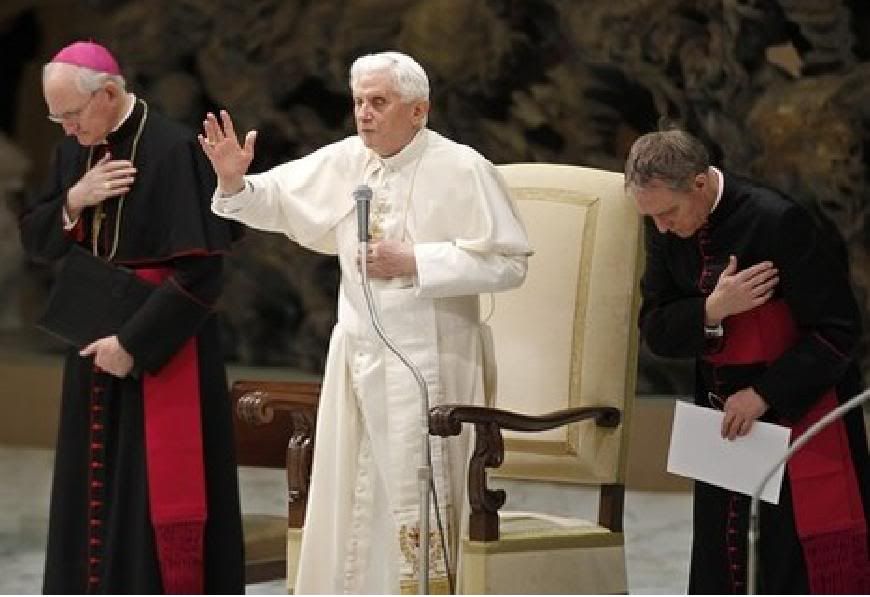
[Modificato da TERESA BENEDETTA 19/02/2011 20:42] |
| |
 16/02/2011 19:05 16/02/2011 19:05 |
|
| | | OFFLINE | Post: 366
Post: 89 | Registrato il: 28/05/2007
Registrato il: 19/02/2009 | Utente Comunità | Utente Junior | |
|
I have to disagree with your assessment, Teresa.
This isn't a mere cry for attention as we've experienced in the past.
This is an organized, determined campaign - possibly enhanced by some desperation, to finally push for a different Church.
Considering the 'non-reaction' of the episcopate, they have a good chance to actually get a result of some sort this time.
People are being approached after Mass to sign the Memorandum, teachers are spreading it through their channels (the majority of German teachers are left-liberal types), and Priests in favor are lobbying for it.
Some Bishops have actually spoken out in support of it.
The majority of parish councils (run by the most dangerous people in all of this: bossy feminists and power-hungry, democracy obsessed, pro-active, always improving and optimizing bureaucrats).
They are determined and they are fearless, they have no respect and will put on their 'freedom of the evil institutional Church' show wherever they go.
And what do they find? Who's their audience?
The majority: insecure, badly catechized, political correct, nominal Catholics without ANY knowledge or sensitivity of theology, who will follow the course, set by the media.
Who have actually been told all their life that this ultra-radical Cardinal with that high Curial position in Rome is an embarrassment to the German Church, which is so much more modern and open and attuned to people’s needs.
And, after giving him a chance for nearly six years, they can finally show him how disappointed they are in him and what they really think about his Dark Age views.
It's not a given thing that everybody of this majority group will agree to their agenda - but that also doesn't mean that the will openly disagree.
The minority: furious, disappointed, defiant, fierce Catholics who are shocked and appalled and who will go to great lengths to defend their faith from dissent and heresy.
They are getting organized and will show their love and support to ‘their’ Pope when he comes to honor them with his visit.
The dissenters are aiming for a German National Church - even if they may call it something slightly different.
They will create their structures (Germans are very good at that!!), they will find a nice, catchy abbreviation for their name, they will have democratic election of their leadership and they will have committee meetings galore.
And, most importantly, they will be happy in constant praise of each other, they will keep padding each other on the back for their incredibly insightful views, they will finally loose connection to Christ (many of them reject the biblical Christ), and they will surely go down the road of becoming an irrelevant, meaningless social organization, along with the other protestant denominations.
Generally, this doesn't bother me - I simply feel bad for all the souls they're so determined to corrupt.
 Well, you are right there, in situ, where it all sounds pretty dire... I did infer the pitifully low numbers of 'right-thinking' German Catholics from the disappointing experience of last summer's attempts to stage pro-Papa demonstrations in some German cities - when the total participation seemed to be less than 10,000 in three cities. And, of course, I realize the capacity of dissidents to mobilize the media in their favor and therefore swing public opinion their way....
Well, you are right there, in situ, where it all sounds pretty dire... I did infer the pitifully low numbers of 'right-thinking' German Catholics from the disappointing experience of last summer's attempts to stage pro-Papa demonstrations in some German cities - when the total participation seemed to be less than 10,000 in three cities. And, of course, I realize the capacity of dissidents to mobilize the media in their favor and therefore swing public opinion their way....
It distresses me greatly that Germans can be so brilliant as individuals but many are apparently capable of being so dumb in the collective and ready to be led by the nose by demagogues, no matter how dubious their message. All these types you are describing give me a glimmer somehow of why the majority of Germans just followed the Fuehrer during the Nazi years...
Assuming your dissidents do split off from Rome, whatever they call themselves, then good riddance! Joseph Ratzinger has always said that Western Christianity may soon be reduced to 'creative minorities'.... Psychologically, however, what will they do for fun - and ego-tripping - when they no longer have Rome and the Pope to kick around?
Why have all those 'We are Church' types in Austria - and, for that matter, all the media-darling Catho-libs of the USA - not split off all these years? They don't have the balls for it, and they'd much rather continue being media heroes by defying and dissing Rome and the Pope - feeding their fantasies of bending Rome to their will - rather than leave the Church, start from scratch, and be like any other Protestant sect with small numbers whom the media will not bother reporting on. Once they break off from Rome, the media will no longer care what they say about Rome and the Pope because their formal schism will have made the subject moot... Just as the MSM never reported on the Lefebvrians for almost 20 years until Benedict XVI decided to meet with Mons. Fellay in Castel Gandolfo in 2005, and then not again until he lifted the bishops's excommunications - i.e, schismatics only make the news insofar as Rome deigns to pay them any attention. On their own? Not news.
Meanwhile, let us wait and see what Benedict XVI has in mind for September. One presumes that he has been doing his homework and marshalling the few resources that the Roman Catholic Church can count on in Germany - perhaps having someone shepherd the present minority 'faithful' into the beginnings of a 'creative minority' in preparation for September????
I am not aware that the dissidents have any charismatic leader at all, but can the 'faithful' not come up with one or more? (I suppose not, or they would have emerged by now.)... And I must say again, if Cardinal Reinhard Marx is going to prove he is worth anything at all, now is the time to do it! But why am I even thinking of him after his misguided ecumenical kowtowing at the last Kirchentag?
TERESA
P.S. We haven't heard so far from Hans Kueng, but last April, after the Pope's letter to Irish Catholics, he had this infamous 'open letter' published by - not coincidentally - the newspapers that would become the Wikileaks outlets months later, in which he called on the bishops of the world to stand and and resist the Pope en masse, or something to that effect, and urged the same things his fellow theologians listed in their Memorandum, only in slightly better language.
Two observations: 1) Not one bishop responded to his call; and 2) Why didn't all these no-name theologians get his signature on their Memorandum? [I may be speaking too soon. I haven't checked the Freiheit site yet - and they may well have enlisted him by now!)
[Modificato da TERESA BENEDETTA 17/02/2011 02:03] |
| |
 17/02/2011 16:18 17/02/2011 16:18 |
|
| | | OFFLINE | | Post: 22.148
Post: 4.775 | Registrato il: 28/08/2005
Registrato il: 20/01/2009 | Administratore | Utente Master | |
|
 Thursday, February 17, Sixth Week in Ordinary Time
Thursday, February 17, Sixth Week in Ordinary Time
 THE SEVEN FOUNDER SAINTS OF THE SERVITE ORDERS (Italy, 13th century)
THE SEVEN FOUNDER SAINTS OF THE SERVITE ORDERS (Italy, 13th century)
They were rich young men in Florence at the height of the Cathari heresy and widespread political and moral breakdown. They belonged to a group of Marian devotees called the Laudesi (Praisers). It is said that in 1240, they had a vision of Mary who urged them to retire in prayer. They did, to a hilltop near Florence, where four years later, they would have another vision which prompted them to establish the order called Friar Servants of Mary (OSM, from the Latin name) - who follow the Augustinian rule, wear the Dominican habit and live like mendicant friars. Their goals are sanctification of each member, preaching the Gospel and spreading devotion to Our Lady of Sorrows. The Servites, as they are commonly known, now have a worldwide family that includes monasteries, religious and secular orders for both men and women, diaconates and secular institutes like the Pontifical Marianum, the leading institute on Mariology. The Seven Founders were canonized in 1888.
Readings for today's Mass:
www.usccb.org/nab/readings/021711.shtml
last year, today was Ash Wednesday, an early start for Lent. This year, Ash Wednesday falls on March 9.
OR today.
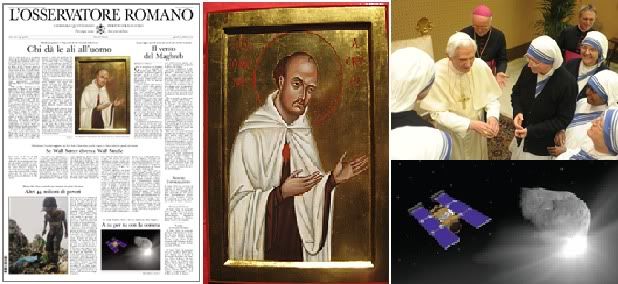 Illustration: St. John of the Cross, contemporary painting by a Carmelite nun from the Carmelo di Concevedo, Italy.
Illustration: St. John of the Cross, contemporary painting by a Carmelite nun from the Carmelo di Concevedo, Italy.
At the General Audience, the Pope speaks of John of the Cross and his mystical theology:
'God gives wings to man'
Other Page 1 stories: An essay on unrest in the Maghreb (North Africa) and the challenge of new evangelization;
the World Bank says 44 million more people crossed into the poverty line in the past six months due to rising food
prices across the world; Wall Street and Frankfurt stock exchanges formalize a historic merger; and a NASA probe
gets up close to a comet (photo above).
PAPAL EVENTS TODAY
The Holy Father met with
- President Dmitrij Anatolievic Medvedev of the Russian Federation, his wife, and delegation.
- Cardinal Leonardo Sandri, Prefect of the Congregation for Oriental Churches
The Vatican issued a communique on the Feb. 15-Feb. 16 meetings of the Council appointed by the Holy Father to study the organizational and economic problems of the Holy See, under the chairmanship of Cardinal Secretary of State Tarcisio Bertone. The consolidated budgets for 2011 of the various Vatican entities (Curia, Apostolic Palace and Vatican media) and the Governatorate of Vatican city state were also presented.
At a news conference led by Abp. Rino Fisichella, president of the Pontifical Council for Promoting New Evangelization, Vatican officials presented a qualitative evaluation of the Pauline Year observed from June 29, 2008 to June 28, 2009, along with a new book L'Anno Paolino, published by the Vatican publishing house, on the major events of that year.
 - Some traditionalist sites like the Italian messainlatino and the US-based Rorate caeli blog have been issuing ominous warnings lately that the expected 'instructions' on Summorum Pontificum to clarify the provisions of the motu proprio will contain restrictions and 'dilutions' of its original intentions that should make all Catholics who care about the traditional Mass fear the worst...
- Some traditionalist sites like the Italian messainlatino and the US-based Rorate caeli blog have been issuing ominous warnings lately that the expected 'instructions' on Summorum Pontificum to clarify the provisions of the motu proprio will contain restrictions and 'dilutions' of its original intentions that should make all Catholics who care about the traditional Mass fear the worst...
And yet, no such instructions could be issued by any entity at the Vatican unless and until they have been reviewed by the Pope. Do these alarmists really think that Benedict XVI would allow such 'restrictions and dilutions' of the clearcut and straughtforward provisions of SP?????
Messainlatino claims to have authoritative information that one of such 'dilutions' would be to exempt the Ambrosian and other lesser-known Roman rites from allowing celebration of their pre-Novus Ordo forms at all. It's hard to imagine that Benedict XVI would deem that any Vatican-II tinkering with these rites has invalidated their traditional forms!
Is the Diocese of Milan's Novus Ordo Ambrosian rite more meritorious than the Ambrosian rite as it survived from its hazy beginnings in the 9th century, through the Council of Trent, and into its last pre-Vatican II revision in 1954? The Ambrosian rite (named after St. Ambrose though he had nothing to do with it, since it started to emerge only in the 9th century) is used in the Archdiocese of Milan, and in parts of the Dioceses of Como and Lugano - with a total of about 5 million Catholics.
Of course, if their 'fears' should turn out to be unfounded, the alarmists can always claim their ante-facto revelations helped avert disaster. What I find unacceptable is not their well-intentioned fears but the apparent lack of trust in the Pope's common sense and judgment!
[Modificato da TERESA BENEDETTA 17/02/2011 23:02] |
| |
 17/02/2011 17:29 17/02/2011 17:29 |
|
| | | OFFLINE | | Post: 22.149
Post: 4.776 | Registrato il: 28/08/2005
Registrato il: 20/01/2009 | Administratore | Utente Master | |
|

 Pope and Russian President
Pope and Russian President
want stronger ties

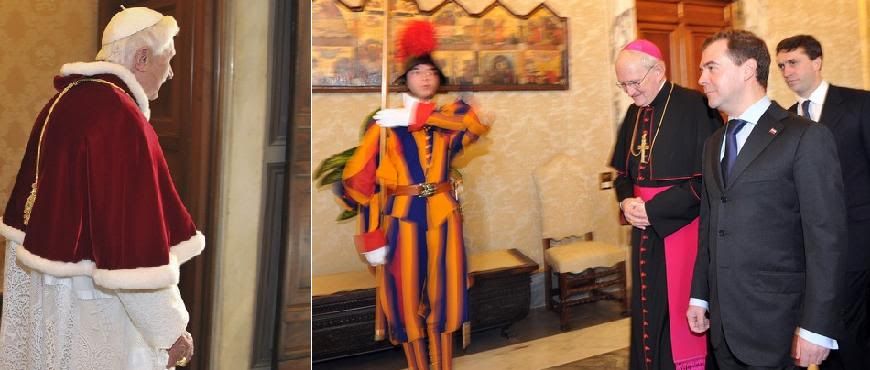
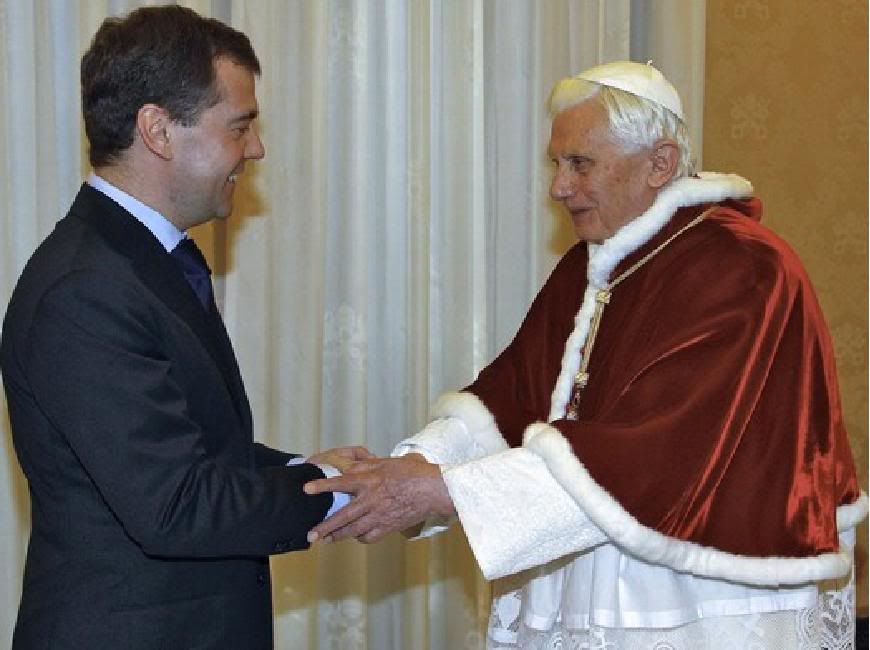
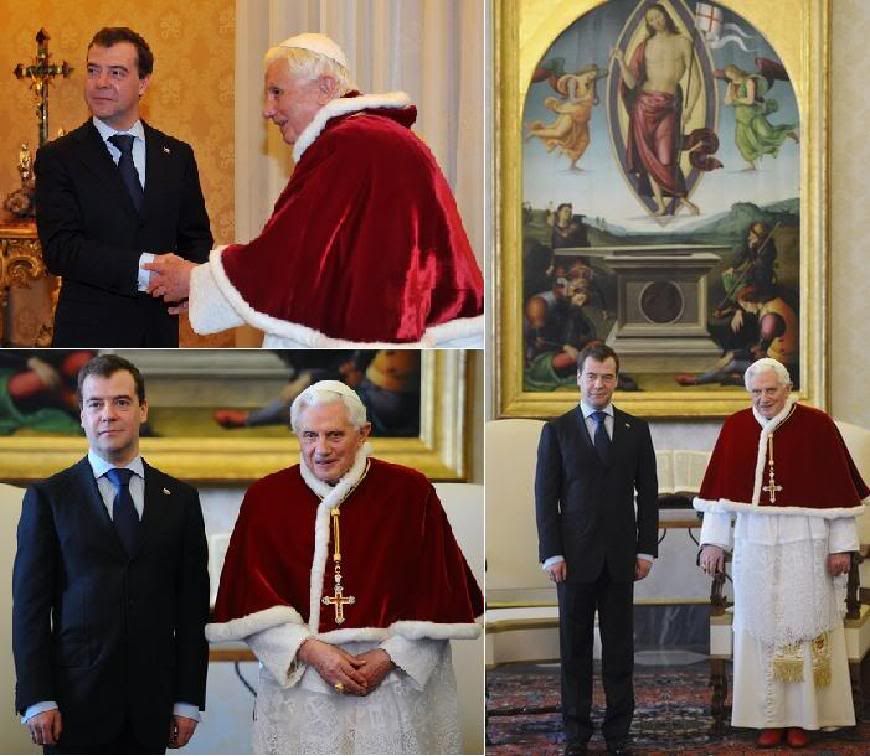
VATICAN CITY, Feb. 17 (AP) – Pope Benedict XVI and Russian President Dmitry Medvedev met at the Vatican on Thursday, stressing the need for better ties and the promotion of shared Christian values, the Holy See said.
"I should learn Russian," the German-born Benedict said following the half-hour private talk, although there was no indication that Benedict would go to Russia.
Long-running tensions in Russia between Orthodox faithful and Catholics prevented Benedict's predecessor John Paul II from achieving his dream of a Russian pilgrimage.
The Holy See's statement sidestepped any mention of the tensions between Russian Orthodox and Roman Catholic churches in Russia, including over property issues, and Orthodox claims that the Catholics are trying to poach converts from the Orthodox's ranks. Instead the Vatican stressed the "positive contribution that inter-religious dialogue can make to society."
Greeting Medvedev, Benedict welcomed him to "a very important meeting" Thursday.
The Vatican said both sides "expressed their pleasure at the good state of bilateral relations and highlighted their desire to strengthen them."
It noted the cooperation between them "in the promotion of specifically human and Christian values, and in the cultural and social field."
The Vatican denies accusations that it aggressively proselytizes in Russia.
After Medvedev's previous talks with Benedict in late 2009, the Vatican and Russia upgraded their diplomatic relations to full-fledged ties.
After nearly a half-century of hostility between the Vatican and the Kremlin during the Cold War, a major breakthrough came when former Soviet leader Mikhail Gorbachev met with the Polish-born John Paul in 1989, just after the fall of the Berlin Wall.
[After that, however, Russian Orthodox Church leaders used long-standing russian-Polish enmity to affect their attitude towars John Paul II. They claimed he fielded Polish missionaries to post-Soviet Russia in order to proselytize the Rusian Orthodox faithl to Catholicism, and were suspcious of Catholic influence in teh Ukraine, which adjoins Poland and has a splintered Orthodox membership which Moscow has been meaning to unite under its influence.]
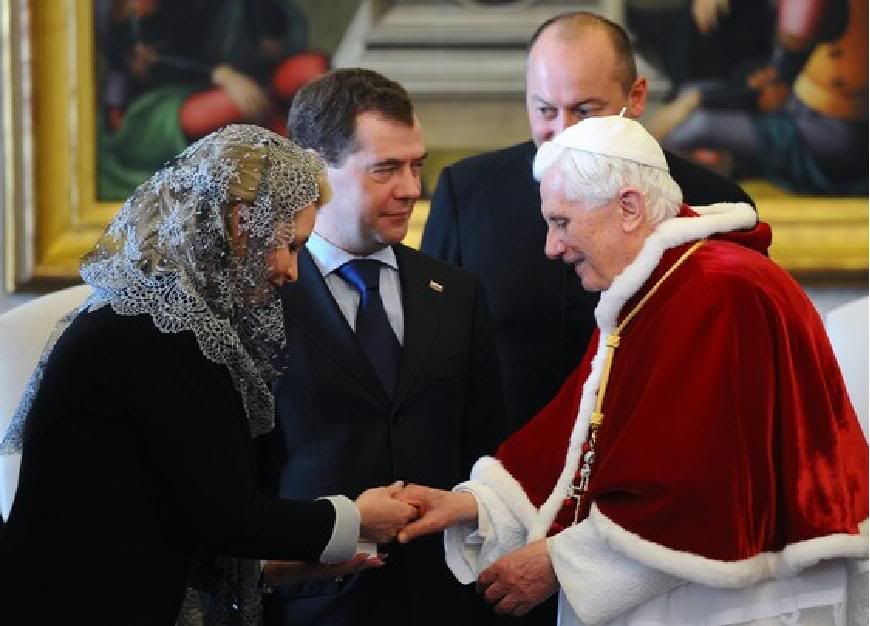
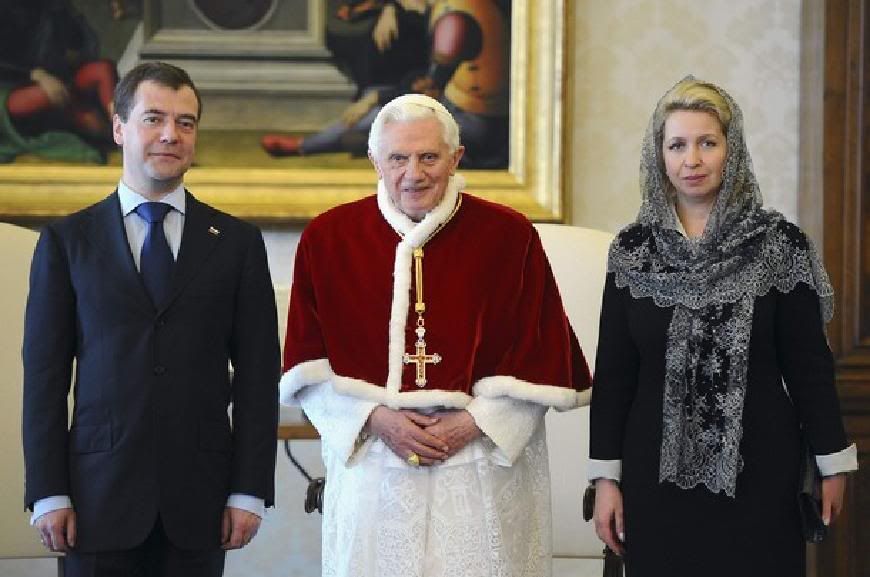
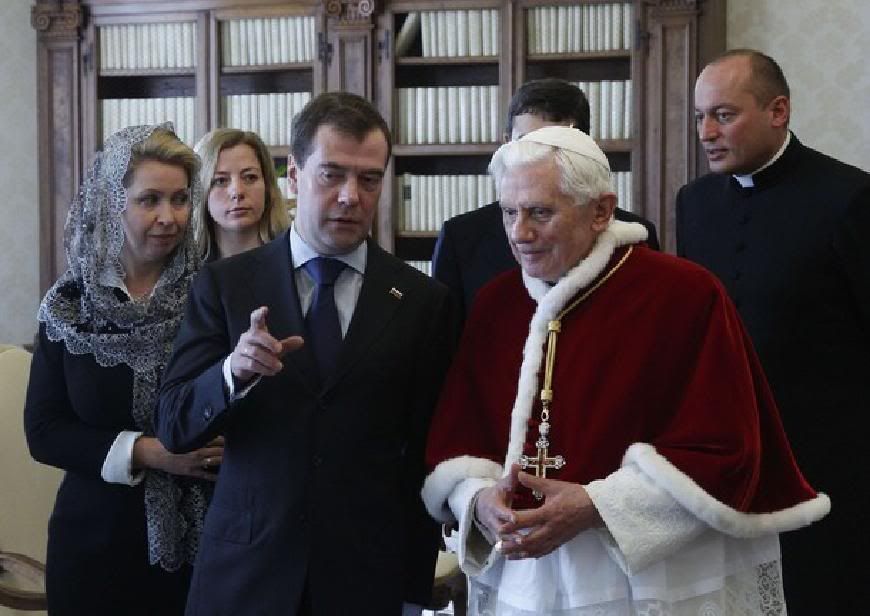
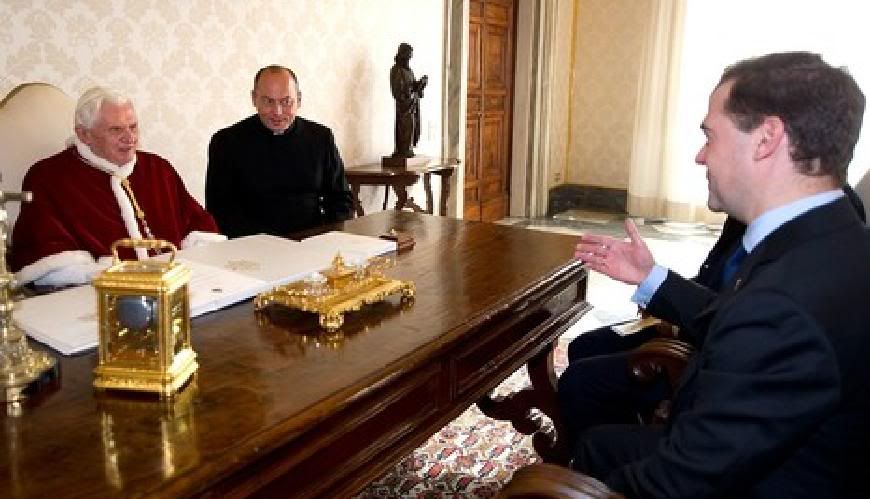
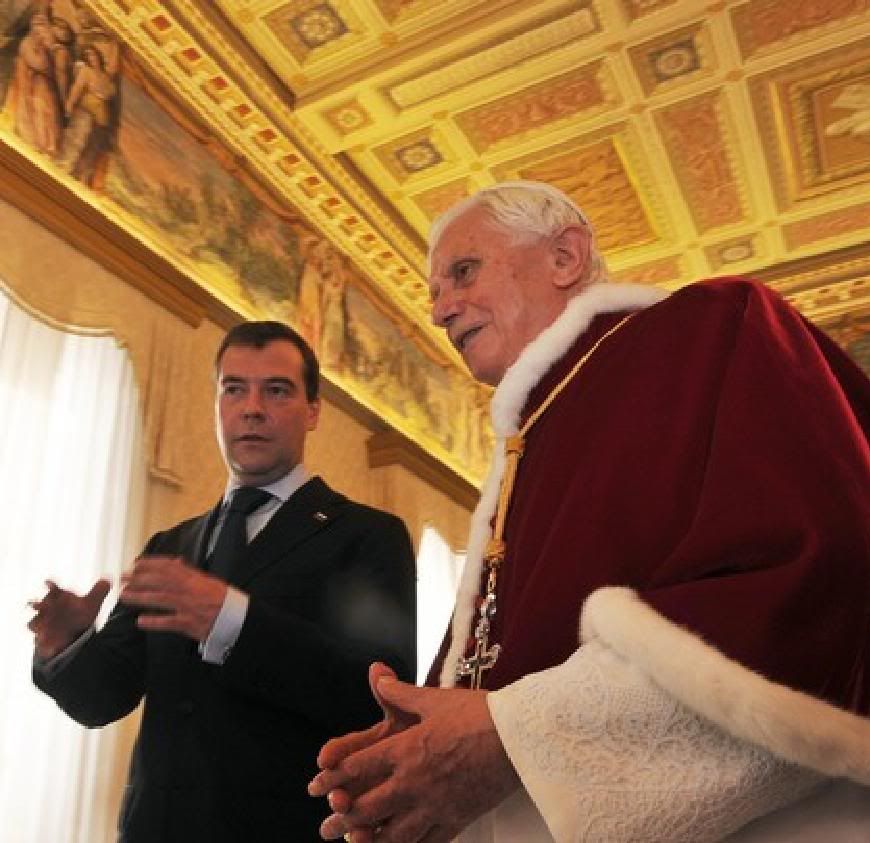
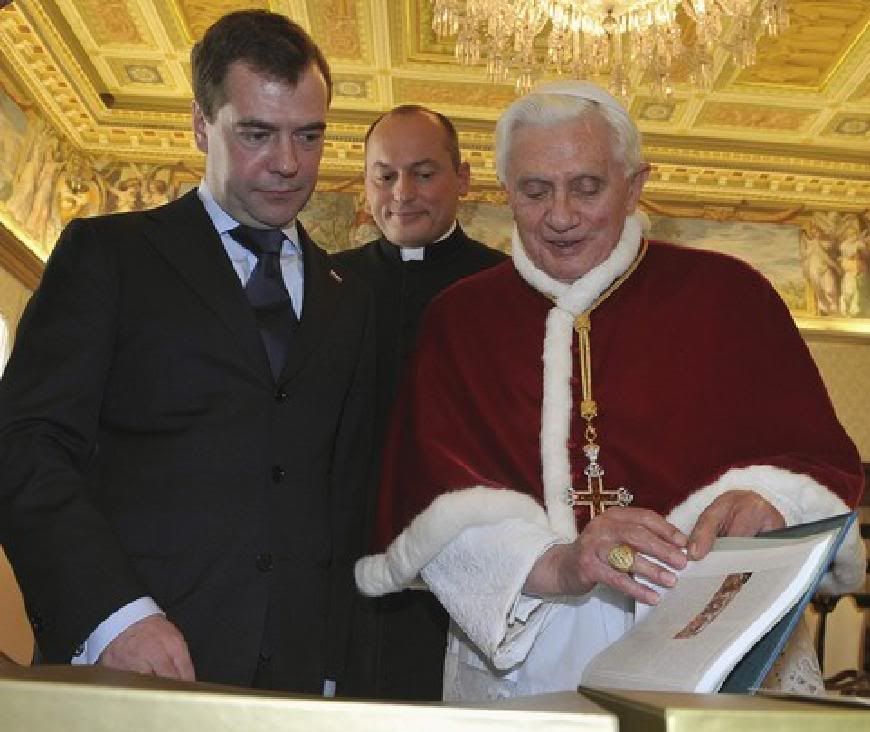
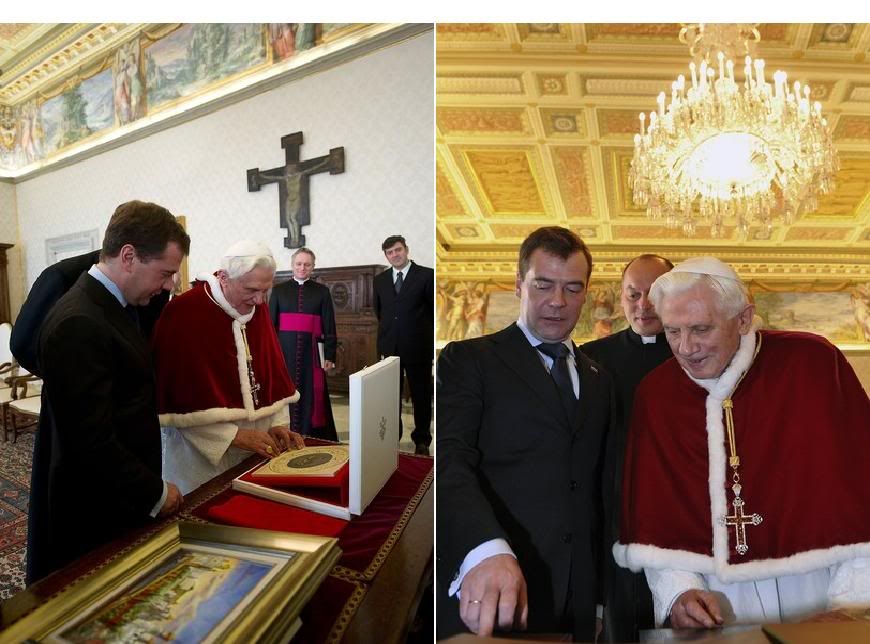 Medvedev presents the Pope with
Medvedev presents the Pope with
the latest volume of Orthodox Encyclopedia

VATICAN CITY, February 17 (Itar-Tass) - Russian President Dmitry Medvedev made an official visit to the Vatican City on Thursday to meet Pope Benedict XVI.
The Medvedevs were welcomed by Swiss Guards, the Pope's personal bodyguard, at the entrances to the Apostolic Palace, in the Courtyard of St Damazo.
Accompanied by Archbishop James Michael Harvey, Dmitry and Svetlana Medvedevs and members of the Russian delegation passed through the suite of rooms of the Apostolic Palace to be welcomed by Benedict in the so-called Small Throne Room (Sala Tronetta).
Medvedev and Benedict XVI talked in the Pope's library about half an hour.
After the talk, the Pontiff met with the Russian president’s spouse and members of the Russian delegation. The Russian president and the Pope exchanged presents.
Medvedev presented Benedict XVI the latest volume of the Orthodox Encyclopaedia. Other books of the Encyclopaedia were earlier presented by Vladimir Putin, who visited the Pope when he was President of Russia. Medvedev said the work on the Encyclopedia continued.
Benedict XVI commented with a smile that unfortunately, he had no time to learn the Russian language.
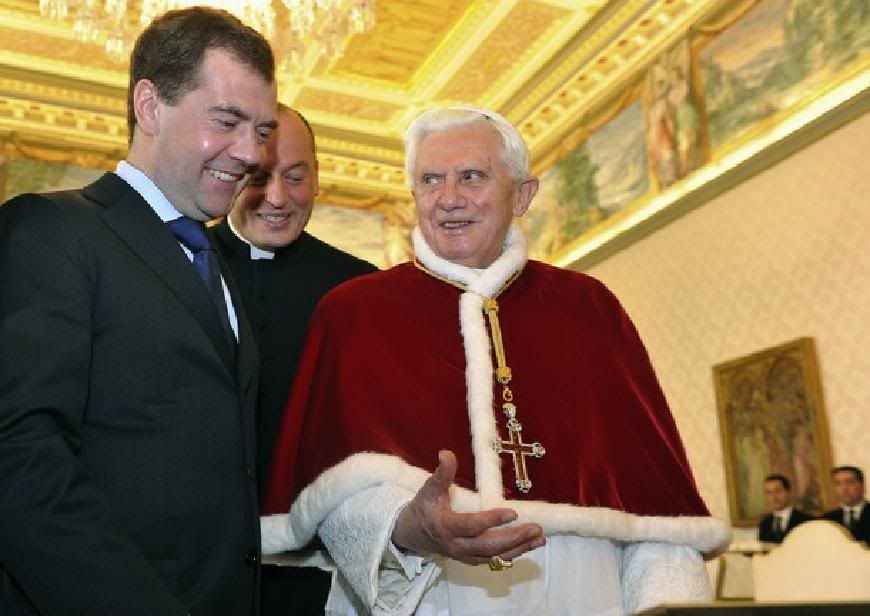
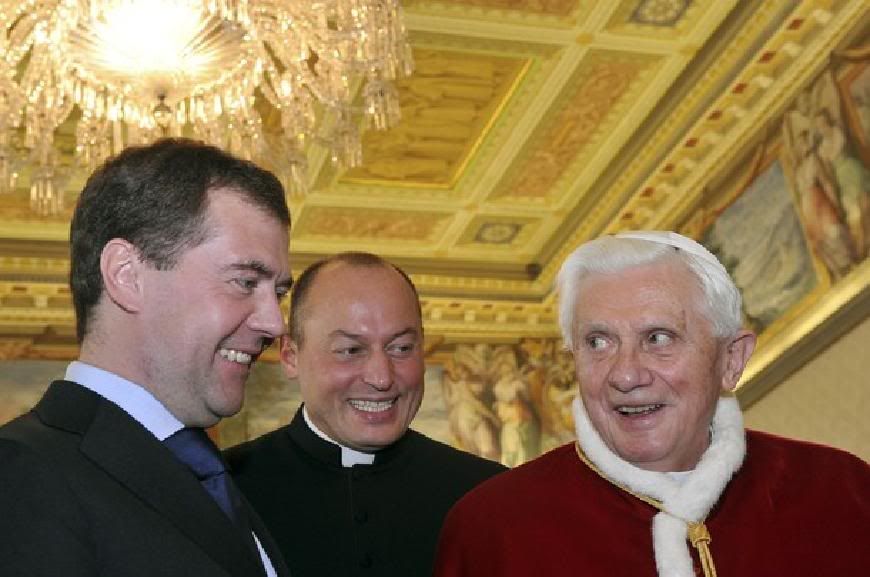
In addition, Medvedev also presented the Pope with an enamel painting of the Moscow Kremlin panorama. “Do you live here?” Benedict XVI asked, as he admired the Kremlin architecture. “No, I only work there,” the President said.
In turn, the Pope presented Medvedev with a mosaic panel of St Peter’s Basilica.
After the meeting with the Pope, Medvedev had a brief talk with Vatican Secretary of State, Cardinal Tarcisio Bertone.
This was Medvedev’s first official visit to the Vatican City after Russia and the Holy See established full-fledged diplomatic relations in December 2009 when Medvedev arrived in the Vatican City on a working visit.
ITAR-TASS also offers this sidebar:
Russian video on Benedict XVI given
to Vatican before Medvedev's visit
VATICAN CITY, February 17 (Itar-Tass) - A new film from the Formula of Power series, titled 'Pope Benedict XVI', was passed to Vatican City through diplomatic channels, in connection with the Thursday meeting between Russian President Dmitry Medvedev and Pope Benedict XVI.
The film, devoted to the Pope and Vatican City State, is a documentary that was a joint project by Itar-Tass and the VGTRK television company.
In Russia, it was run on Vesti-24 news channel first in a 24-minute version, and then in an expanded 54-minute version on the occasion of Catholic Christmas on December 25, 2011.
The documentary is about Vatican City's history and its present, and includes by the Pope, influential hierarchs, members of the Roman Curia and a comment by Metropolitan Hilarion of Volokolamsk, "the foreign minister" of the Russian Orthodox Church.
[Modificato da TERESA BENEDETTA 18/02/2011 12:41] |
| |
 17/02/2011 18:57 17/02/2011 18:57 |
|
| | | OFFLINE | | Post: 22.150
Post: 4.777 | Registrato il: 28/08/2005
Registrato il: 20/01/2009 | Administratore | Utente Master | |
|

 The French Decadent poets of the late 19h-century (Baudelaire and Rimbaud and the English school of Oscar Wilde) left a memorable expression, "epater les bourgeois!' - 'Shock the bourgeois!" - by which they meant to rock the middle classes out of their complacencies and certainties by being as scandalously outrageous as they could in their behavior and in their work. To thumb their noses in contempt at the bourgeois lifestyle and the values that the solid middle class traditionally represented.
The French Decadent poets of the late 19h-century (Baudelaire and Rimbaud and the English school of Oscar Wilde) left a memorable expression, "epater les bourgeois!' - 'Shock the bourgeois!" - by which they meant to rock the middle classes out of their complacencies and certainties by being as scandalously outrageous as they could in their behavior and in their work. To thumb their noses in contempt at the bourgeois lifestyle and the values that the solid middle class traditionally represented.
Now, the editors of AMERICA, the ultra-liberal weekly magazine of the American Jesuits, have come up with a recommendation meant to 'epater les fideles' - shock the faithful, while rocking the Vatican boat, they hope - urging that laymen should be eligible to be named cardinals, elect the Pope, advise the Pope and run the Vatican.
Because the article makes not a single reference even to the far-less-shocking-because-too-predictable-and-oldhat 'demands' of the German theologians two weeks ago, one also suspects the magazine is playing one-upmanship on their German-speaking fellow travelers, i.e., "BAH! You're still talking small change. Here's the really big deal. Let's see you top that!!" Are we witnessing a pissing contest here on who can be the most radical and shocking dissenter?.
But they are also being gravely dishonest. They could have come up with this editorial years ago, but by coming out with it now, they are actually taking advantage of the ground laid by the German theologians to call attention to their far more radical prOposal.
By the way, don't be deceived by the cowardly headline they gave to the editorial. Also, don't forget these are Jesuits, who are masters of the specious argument - they can make something look plausible when it is actually wrong (there's a reason a synonym for 'specious' is 'jesuitical')! As I find the entire editorial preposterous, I will simply present it all in purple.
Laity near the top?
The Editors

Issue of FEBRUARY 21, 2011
While the pontificate of Pope Benedict XVI has certainly enjoyed major successes, like the pope’s visit last fall to England to beatify Cardinal Newman, the crises that have led to empty pews in the Catholic parishes of England, Europe and the United States persist.
The fundamental criticism of the institutional church is that its clerical, all-male establishment has not made room for other voices. There is no need to list the number of recent policy decisions, from Rome to home, which would have been more prudent if only a variety of laypersons had been consulted.
Jesus told his disciples that they were servants, that they were to feed the hungry and share their wealth with the poor and that they should demonstrate their love for one another by offering their lives in service.
Some in church leadership have done the opposite, creating a culture of clericalism that too often values loyalty over accountability. In these circumstances, a project of reform is essential to rejuvenate church leadership and give greater voice to the whole church.
As Pope John Paul II wrote in “Novo Millennio Ineunte,” quoting St. Paulinus of Nola: “Let us listen to what all the faithful say, because in every one of them the Spirit of God breathes” (No. 45).
How to begin? No one should anticipate changes in the existing discipline on celibacy or in the teaching on women’s ordination, but there are other ways to reform church structures to allow women and married men to participate in church governance.
One proposal is simply to change canon law to admit laypeople to the College of Cardinals. The church could thereby continue its all-male priesthood, yet transform the “men’s club” into a church with a face that more resembles the people of God described in the documents of the Second Vatican Council.
A more realistic proposal, however, would entail two steps:
First, reorganize diocesan offices so that laypeople constitute at least half of the bishop’s principal advisers. (Increasing numbers of laity have already been hired as staff in many U.S. dioceses.)
Second, create a new body, an international council of laypersons to share functions with the College of Cardinals. After attrition among the cardinals, each of the two bodies eventually could have 100 members. The lay members would be Catholics who love the church and are recognized for sound Christian judgment
They would come from a variety of occupations — education, health, religious life, law, the arts, business, science, government and labor. Church leadership would not be limited to elderly men but would be expanded to include men and women, married and unmarried, of different ages.
Wisdom, after all, can be found from a multitude of sources, something that St. Benedict acknowledged when he urged an abbot at a monastery to solicit the opinion of even the youngest member of the community: “By the Lord’s inspiration, it is often a younger person who knows what is best.”
Some members of the council would direct Vatican offices; others would come to Rome for regular consultation. Membership could be proportionate to the Catholic populations throughout the world, chosen for a specified term on the recommendation of grass-roots representative caucuses of clergy and laity.
The combined college and council would share three functions: administer the Vatican offices, advise the Pope and select his successor.
These laypeople would offer much-needed perspective on the impact of the teachings and practices of the church, including such divisive subjects as contraception, the role of women in the church, the treatment of homosexuals and the failure of authorities to respond quickly and forcefully to the scandal of sexual abuse by members of the clergy.
They would understand other pastoral failings, like the denial of the Eucharist to public persons because of their political positions, a too modest peace and justice agenda, lackluster liturgies with unprepared sermons and insensitive celebrants.
One may object that this initiative is a “pie in the sky” idea that the clerical establishment would never accept. Perhaps. Yet the implementation of specific alternatives like a lay council need not threaten the current leadership.
For the authority of the church “is exercised in the service of truth and charity” (“Ut Unum Sint,” No. 3). Nor would a council undermine the Pope’s authority.
As Pope John Paul II wrote of the papacy: “The authority proper to this ministry is completely at the service of God’s merciful plan and it must always be seen in this perspective” (No. 92). Discerning that plan is a task that Catholics should take on together.
Following Pope John Paul’s example we encourage our readers, clergy and lay, to evaluate this proposal and suggest other reforms that would achieve the same goals.
The church has survived these 2,000 years because at key moments it chose the path of renewal. It may be that another such moment has arrived.
But haven't you folks at AMERICA always claimed that Vatican II - which concluded only 45 years ago - represented not just a 'renewal' of the Church but 'the birth of a new Church'? What happened? Have you finally given up that foolish and utterly counter-productive 'crusade' to go for a simpler, one-track attack?
One could well add this 'bolder than bold' proposal to William Oddie's arguments for saying that the 'spirit of Vaitcan II' is in its dying gasps. It seems the editors of AMERICA have just breathed the last gasp on that fictitious 'spirit', so now they are trying to revive it in an even more radical way, going beyond anything Vatican II ever proposed!
And yet, as John Paul II and Benedict XVI have always pointed out, so much about Vatican II still has to be executed and must be executed before the Church goes raring off into other directions.
Twice in the editorial, the writers cite John Paul II, a shameless exploitation of the Pope's name at a time when he is about to be beatified, in order to posthumously invoke his sponsorship for an idea that could not have been implied in anything he said or wrote! If it had been, then these ultra-libs would have invoked it long ago, not just now!
There are two glaring fallacies in this proposal that even a simple layman like me can see:
1. Naming lay people to be cardinals throws the entire tradition of apostolic succession out the window. Cardinal-electors are also bishops, and by definition, successors to the Apostles - that is, the Apostles as they were after Jesus chose them to be the Twelve and sent down the Holy Spirit to them at Pentecost, not as the 'laymen' they were before Jesus called them to 'follow him' in every sense of the word.
2. How are these lay people who will 'run the Vatican, elect the Pope, and advise the Pope' to be named and by whom? It can't be arbitrary in any way, but then, do they imagine the Church would then have to institute periodic elections from the parish level upwards to choose these lay people whose 'sound Catholic judgment' would then be decided by the standards of the constituency that elects them (parish, diocese, region, etc), which could range from constituencies who practice an 'anything goes' and pick-and-choose Catholicism to strict traditionalist communities if those still exist.
But that is to deliberately misconstrue the idea of religion and of faith, subjecting the 'faith' unnecessaarily and stupidly to the
periodic whims and caprices - and the capacity for political organization - of unordained laymen!
In fact, the whole argument of the AMERICA dissidents - like the warmed-over-to-bitter-brittleness proposals of the German theologians - is all about getting and exercising power within the Church, about the 'outs' wanting to get in.
The Church, imperfections and all, is what it is today - still the Church founded by Christ and built up by the Apostles and their successors - after more than 2000 years, because by and large, she has remained faithful to its sensum fidei, and Peter remains its unshakeable Rock.
What arrogance for these dissidents to think that with their puny petitions and shock-schlock editorials, they can shake her to the foundations and rebuild her according to their desires!
![[SM=g8126]](https://im0.freeforumzone.it/up/0/26/3169140.gif) ![[SM=g8126]](https://im0.freeforumzone.it/up/0/26/3169140.gif) ![[SM=g8126]](https://im0.freeforumzone.it/up/0/26/3169140.gif) ![[SM=g8126]](https://im0.freeforumzone.it/up/0/26/3169140.gif) ![[SM=g8126]](https://im0.freeforumzone.it/up/0/26/3169140.gif) ![[SM=g8126]](https://im0.freeforumzone.it/up/0/26/3169140.gif)
[Modificato da TERESA BENEDETTA 17/02/2011 23:04] |
| |
 17/02/2011 20:45 17/02/2011 20:45 |
|
| | | OFFLINE | Post: 367
Post: 90 | Registrato il: 28/05/2007
Registrato il: 19/02/2009 | Utente Comunità | Utente Junior | |
|
Three words for those delusional Jesuits: JOIN THE PROTESTANTS!!!!
Where all of your dreams are already reality... but wait... all those thousands of protestant denominations are irrelevant social clubs... now that's not high profile enough for good, public dissent, is it?
Maybe it IS the collective last breath of bourgeois, stuck in the 70ties type of formerly anti-establishment types.
All I know is... I'm ready for my own share of the fight!
 NAHHHH! Protestants are no fun - at least not for the Jesuits and the whole array of dissident Catholics who cannot bear to break away from a Church they claim to be ashamed of. I wonder why!
NAHHHH! Protestants are no fun - at least not for the Jesuits and the whole array of dissident Catholics who cannot bear to break away from a Church they claim to be ashamed of. I wonder why!
As you say, 'high profile' is what they're aiming for.
No other major religion has a Pope - and secretly, each of our dissidents would really like to be Pope (provided they could have a wife, of course, or a husband, or a same-sex partner - since their liberalizing charity would begin at home). If they so resent Roman 'centralism', why has not one of them ever proposed eliminating the position of Pope? Aha!
They can't want to be the Dalai Lama because one has to be recognized as the reincarnation of a past Lama to become Dalai Lama or Panchen Lama or any of the Tibetan Buddhist hierarchy. Besides, let me append something that probably all those New Age types who worship at the Dalai Lama's feet have never thought of - they'd have to be celibate, God forbid!
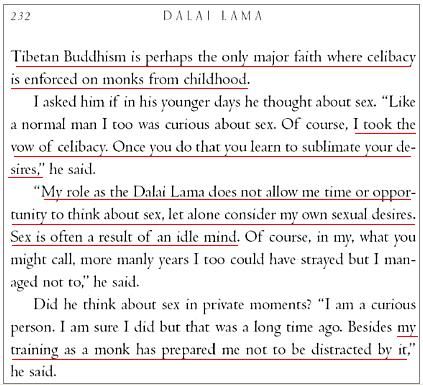
And they can't want to be Grand Imam, Grand Mufti, Grand Ayatollah, Grand Mullah or what-have-you because not one of those 'grandees' is the 'one' leader of Islam, as the Pope is for Catholics. And our dissidents must be averse to living in the 9th century with 9th century clothes and mores and laws. And good luck with bringing them into the third millennium.
What can they look forward to in the Protestant world? Be president of the World Council of Churches? Or the World Lutheran Federation? Those are significant positions but hardly in the 'sui generis' category of the Pope. Even Hans Kueng, with the 'world religion' he has been trying to peddle all these years, clearly sees no attraction in that (just as no one seems to be buying his snake-oil wares).
They can't aspire to be Archbishop of Canterbury because the Anglicans do not as yet have any 'Romanorum coetibus' arrangements - and would never honor any johnny-come-latelies with the primacy of the Church of England.
Or would they settle for being one of those contemporary evangelical pastors with their mega-churches, stadium-packing Sunday services, string of best-selling books and thriving commercial empires? Nah, you have to have the gift of gab and a showman's charisma that can hold a mega-assembly in thrall. But name one prominent Catho-lib anywhere who can do that, or who can even match the likability of crowd-galvanizing evangelical pastors from Billy Graham to Rick Warren and Joel Osteen today. In fact, even orthodox Catholicism, as I commented recently, has not managed to produce another Fulton Sheen whose personality and preaching were spellbinding!
Or they can try their luck in the splintered multi-denominational spectrum of Judaism - but then again, still no Supreme Rabbi there. And they may object to being circumcised.
NOPE! Clearly, the primrose path to name and fame is in the Catholic Church, where all they have to do is denounce its practices and the Pope often enough and viciously enough, and voila! they are media darlings forever and ever.
Finally, I must not forget to thank you, Heike, for providing the Forum with valuable concrete on-the-spot information about the situation in Germany - it's something I would never hope to find out if all I read were the news reports and commentary in the MSM.
And to thank you as well for consistently providing a springboard for reflection...
TERESA
[Modificato da TERESA BENEDETTA 18/02/2011 01:20] |
| |
 18/02/2011 11:02 18/02/2011 11:02 |
|
| | | OFFLINE | | Post: 22.151
Post: 4.778 | Registrato il: 28/08/2005
Registrato il: 20/01/2009 | Administratore | Utente Master | |
|
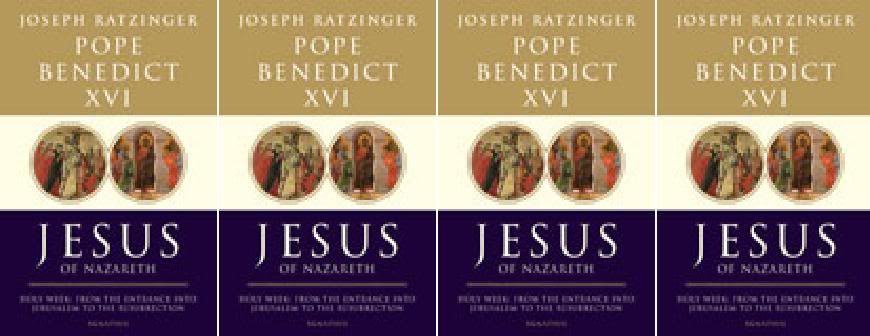
 Volume 2 of JON: The Pope's reflections
Volume 2 of JON: The Pope's reflections
on Christ's passion, death and resurrection
appropriately ushers in Lent this year
Translated from

February 17, 2011
"The Lord has truly risen. He is the living God". This might be the statement that synthesizes the message of Pope Benedict XVI in the much-awaited second volume of his JESUS OF NAZARETH which will be presented on March 10 in Italy, the Thursday after Ash Wednesday, when Lent begins.
In this volume, he reflects on the events of the Passion, death and resurrection of Jesus Christ.
"In this second volume we encounter the decisive words and events in the life of Jesus. I hope this will allow an introspective consideration of the figure of our Lord that could be of help to all readers who seek to encounter Jesus and to believe in him," the Pontiff writes in the Introduction.
The book, which comes out four years after Volume 1 (published April 18, 2007, on the Pope's 80th birthday), is subtitled "From the entrance into Jerusalem to the Resurrection". In Italy, it will be published by the Vatican publishing house LEV, which has ordered 300,000 copies for the first printing. Rizzoli will distribute the book.
Simultaneously, it will come out in 22 countries - in Germany, by Herder; in the USA, by Ignatius Press.
In the first book, Benedict XVI presented Jesus "as a logical and much more intelligible figure, historically speaking, than the reconstructions we have been presented in the last decades".
Writing about the first part of Jesus's public ministry in Volume i,, he explains that the Jesus of the Gospels is the the true Jesus, the historical Jesus.
In this second part of his 'personal search for the face of Christ', the theologian Pope explores questions which represent the heart of Christianity. why did Jesus die? Why was he rejected by the religious Wleaders of his time? Who was responsible ultimately for his death? How did he himself look at his Passion and death? What is the Resurrection? What does it mean to Christians?
The Pope underscores that Jesus is the Son of God, not the protagonist of a myth, nor a simple revolutionary or prophet. He maintains that if historical studies have not 'proven' his divinity, neither have they shown the contrary.
Papa Ratzinger places the reader face to face with a historical Jesus, true man, who teaches and acts in ways that demonstrate and proclaim his divine authority.
In his presentation, the Pope employs all his erudition and the initiative of a researcher, but also the human participation of a pastor of souls. And he reiterates the statement he made in the first volume that these texts are not intended to be acts of the Magisterium, and therefore, "Everyone is free to contradict me".
Of course, there is talk already that the Pope has started work on a third volume dedicated to the Gospels on the annunciation, the birth of Jesus and his childhood.
Meanwhile, Volume II will be presented at the Vatican on March 10, which is not a casual choice, since it is the day after Ash Wednesday, which begins Lent.
The day before, Benedict XVI would have led the traditional procession on the Aventine Hill, the papal event that initiates the rites of Lent, the liturgical period that leads believers towards the events of the Passion, death and resurrection of Jesus.
Apparently, the writer has seen the book or the manuscript, or at least parts of it, but does not indicate how he/she got access since no one else has, so far. Also, it is strange that the article has no byline.
[Modificato da TERESA BENEDETTA 20/02/2011 15:33] |
| |
 18/02/2011 12:17 18/02/2011 12:17 |
|
| | | OFFLINE | | Post: 22.152
Post: 4.779 | Registrato il: 28/08/2005
Registrato il: 20/01/2009 | Administratore | Utente Master | |
|

 Joseph Ratzinger's 'Complete Works'
Joseph Ratzinger's 'Complete Works'
introduced in Padua as part of
preparations for Pope's visit
to northeast Italy in May
by Silvia Guidi
Translated from the 2/17/11 issue of

 Sorry, The original PDF online for the flier is fuzzy.
Sorry, The original PDF online for the flier is fuzzy.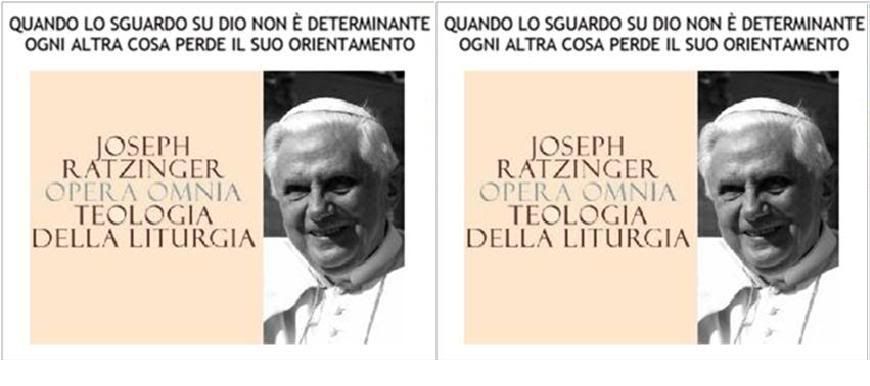
Joseph Ratzinger's Opera Omnia was presented at the Theological Faculty of the Triveneto [the area of northeast Italy that covers the regions of Veneto, Trentino-Alto Adige/Südtirol, and Friuli-Venezia Giulia] on Thursday, Feb. 17, by Mon. Gerhard Mueller, Bishop of Regensburg, and president of the Institut Benedikt XVI which undertook the project.
Mons. Mueller delivered a lectio magistralis on the Theology of Liturgy: The sacramental foundation of Christian existence, the first volume translated into Italian of the collected works of Joseph Ratzinger (everything he wrote before he became Pope), which come to 16 volumes (Five volumes have already been published in GErman.)
The event was part of the region's preparation for the Pope's visit to Aquileia and Venice on May 8-9. (Padua is part of the Patriarchate of Venice).
Fr. Andrea Toniolo, president of the Theological Faculty opened the proceedings after a greeting from Mons. Antonio Mattiazzo, Bishop of Padua.
Also speaking at the presentation was Fr. Luigi Girardi, president of the Santa Giustina Institute of Pastoral Liturgy in Padua, with the lecture, "Joseph Ratzinger: A theologian confronts liturgy".
"In the long history of Pope Benedict XVI's predecessors," wrote Mons. Mueller, "one can compare him to the eminently erudite 18th century Pope Benedict XIV (1740-1758) but also to Pope Leo the Great (440-461), who formulated the decisive Christological confession of the Council of Chalcedon (451).
Here are parts of Bishop Mueller's presentation:
For more than 50 years, the name of Joseph Ratzinger has been associated with an original view of systematic theology in its entirety. His writings represent a union of scientific knowledge in theology to the living faith experienced by the writer.
Complex topics are not subjected to complicated reflection that render them incomprehensible to common understanding but he makes them transparent by the intimate linearity of his presentation.
Regensburg, of course, has a special place in the personal story of the theology professor who was destined to follow John Paul II as Pope.
In his academic career, Joseph Ratzinger has taught in the Institute of Superior Studies in Freising and the universities of Bonn, Muenster, Tuebingen and, finally, Regensburg, where he taught from 1969 until he was named Archishop of Munich-Freising in 1977.
After that, then Cardinal Ratzinger remained closely tied to the city and diocese of Regensburg during the long period when he was prefect of the Congregation for the Doctrine of the Faith (1982-2005). He regularly came back to visit his brother Georg.
His homilies at the Cathedral of Regensburg on various liturgical feasts were unforgettable. His parents Joseph and Maria Ratzinger, and his sister Maria, are buried in the cemetery of Ziegetsdorf in Regensburg diocese.
"After so many years moving from place to place and changing assignments, we were once more at home", he wrote at the time he built a house in Pentling, at the outskirts of Regensburg.
During the Pope's apostolic visit to his native Bavaria in 2006, Benedict XVI underscored once more the intimate link between faith and reason in the now world-famous 'Regensburg lecture' - the fact that neither faith nor reason are able to achieve their respective goals independent of each other. Correcting and purifying each other, reason and faith save themselves from dangerous pathologies.
In this sense, Pope Benedict follows the great tradition of the theological sciences, which, in the global structure of a university, function as a connective element.
In this way, Regensburg became the 'genius loci' [tutelary deity] which has undertaken to assemble and take custody of his complete theological works.
Regensburg is a city which, with its eminent history of erudite bishops like Albert the Great (1260-1262) and Johann Michael Sailer (1821-1832), confirms the rationality of faith and the pastoral fruitfulness of knowledge.
It is a tradition that was carried forward by Archbishop Michael Buchberger (bishop from 1927-1961) under whose direction the Lexikon für Theologie und Kirche took shape.

[Modificato da TERESA BENEDETTA 18/02/2011 12:36] |
| |
 18/02/2011 14:27 18/02/2011 14:27 |
|
| | | OFFLINE | | Post: 22.153
Post: 4.780 | Registrato il: 28/08/2005
Registrato il: 20/01/2009 | Administratore | Utente Master | |
|
 Friday, February 18, Sixth Week in Ordinary Time
Friday, February 18, Sixth Week in Ordinary Time
 BLESSED GIOVANNI (John) DA FIESOLE (b Fiesole 1395, d Rome 1455), Dominican brother, Renaissance painter, Patron of Christian artists
BLESSED GIOVANNI (John) DA FIESOLE (b Fiesole 1395, d Rome 1455), Dominican brother, Renaissance painter, Patron of Christian artists
The world knows him best as Fra Angelico, one of the most prolific and universally admired of painters. He was born in the picturesque town of Fiesole that overlooks Florence and took up painting as a boy. He joined the Dominicans when he was 20, taking the name Fra Giovanni, then came to be known as Fra Angelico, perhaps a tribute to both his own personal qualities and the devotional quality of his works. Michelangelo once said of him, “One has to believe that this good monk has visited paradise and been allowed to choose his models there.” He also served in leadership positions within the Dominican Order. At one point Pope Eugenius approached him about serving as archbishop of Florence. Fra Angelico declined, preferring a simpler life. In formally beatifying him in 1982, Pope John Paul II also declared him the Patron of Catholic Artists, saying: "Fra Angelico was reported to say 'He who does Christ's work must stay with Christ always'. This motto earned him the epithet 'Beato Angelico', because of the perfect integrity of his life and the almost divine beauty of the images he painted, to a superlative extent those of the Blessed Virgin Mary. Fra Angelico is buried in the Dominican Church of Santa Maria sopra Minerva in Rome.
Readings for today's Mass: www.usccb.org/nab/readings/021811.shtml
OR today.
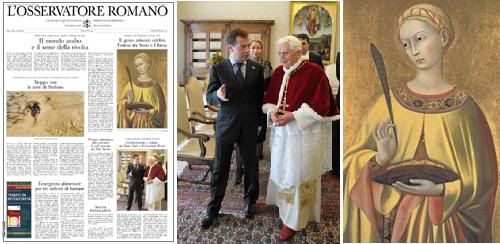 The main papal story is the audience with Russian President Medvedev. And to commemorate this year's anniversary of the 1929 Lateran pacts, the embassy of Italy to the Holy See is displaying two masterworks, Santa Lucia, a 14th-century painting by the Maestro della Osservanza of Siena (photo above), and a Holy Trinity painted by Lorenzo Lotto in 1523, from a church in Bergamo. Page 1 international news includes an update of the various uprisings in the Arab world, the crisis for high-tech industries of the West by China's restriction of its 'rare earth' exports (a group of chemical ores almost exclusively found in China alone, which are necessary to all high-tech manufacture); and the growing food crisis for three million Haitians.
PAPAL EVENTS TODAY
The main papal story is the audience with Russian President Medvedev. And to commemorate this year's anniversary of the 1929 Lateran pacts, the embassy of Italy to the Holy See is displaying two masterworks, Santa Lucia, a 14th-century painting by the Maestro della Osservanza of Siena (photo above), and a Holy Trinity painted by Lorenzo Lotto in 1523, from a church in Bergamo. Page 1 international news includes an update of the various uprisings in the Arab world, the crisis for high-tech industries of the West by China's restriction of its 'rare earth' exports (a group of chemical ores almost exclusively found in China alone, which are necessary to all high-tech manufacture); and the growing food crisis for three million Haitians.
PAPAL EVENTS TODAY
The Holy Father met with
- Six bishops from the Philippines (central region, Group 4) on ad limina visit. Individual meetings.
Later, he addressed the entire delegation. Address in English.
- Cardinal William Joseph Levada, Prefect of the Congregation for the Doctrine of the Faith (weekly meeting).
The Vatican released more details relating to the beatification rites of John Paul II on May 1, as well as a notice from the Pontifical Household warning pilgrims against tour operators charging anything for the chance to attend the Beatification Mass. As always, the Vatican pointed out, everyone is free to come to the public events at the Vatican, and even the tickets issued by the Pontifical Household are given out free of charge [but are not really necessary].
The Vatican also announced the presentation of the Holy Father's JESUS OF NAZARETH, Vol. 2, at the Vatican Press Office on March 10, The Presentors will be led by Cardinal Marc Ouellet, prefect of the Congregation for Bishops.
Bertone and Berlusconi will both
attend anniversary celebration
of the Lateran pacts tonight

ROME, Feb. 18 (AP) – An annual celebration of the 1929 treaty that governs relations between Italy and the Vatican is taking an awkward turn, with Premier Silvio Berlusconi, engulfed in a prostitution scandal, due to mingle with the Vatican's No 2. official.
Berlusconi has come under criticism from the Catholic church as the scandal centering on his alleged encounters with a 17-year-old Moroccan girl have been unveiled.
The 74-year-old leader was recently indicted on charges he paid for sex with the girl, and then abused his influence to cover it up. Berlusconi denies the charges.
Berlusconi and Cardinal Tarcisio Bertone, the Vatican's secretary of state, will lead respective delegations at the ceremony Friday to mark the anniversary of the Lateran Pacts.
So what's the big deal? Media sanctimony is so annoying and absurd! Berlusconi, though indicted, is considered under the law to be innocent until proven guilty. And the Church does not judge individuals. There would be no meetings possible among anyone if the Church refused to meet with sinners, since all men are sinners, including representatives of the Church themselves!
[Modificato da TERESA BENEDETTA 18/02/2011 14:52] |
| |
 18/02/2011 15:14 18/02/2011 15:14 |
|
| | | OFFLINE | | Post: 22.154
Post: 4.781 | Registrato il: 28/08/2005
Registrato il: 20/01/2009 | Administratore | Utente Master | |
|

 Main events in May rites
Main events in May rites
for John Paul II's beatification
Translated from

February 18, 2011
The beatification of the Venerable John Paul II will be a great Church celebration with five main events:
1. The Preparatory Vigil will take place on Saturday evening, April 30, from 8:00-10:30 p.m. at Rome's Circo Massimo, organized by the Diocese of Rome, which had the future Blessed as its Bishop.
The vigil will be led by Cardinal Agostino Vallini, Vicar General of Benedict XVI for the Diocese of Rome. The Holy Father will join the vigil through a video link.
2. The beatification rite itself will take place on Sunday, May 1, in St. Peter's Square, starting at 10 a.m., The Holy Father will preside at the Mass and rites.
Attendance at the Mass does not require any tickets or passes, but access to the Square and adjacent zones will, as usual, be under the supervision of Italian public security.
3. Veneration of the remains of the new Blessed will be possible fro all the faithful on May 1, shortly after the Mass of beatification and will continue until all pilgrims have been accommodated. For this purpose, the remains of the late Pope will be on view in front of the main altar of St. Peter's Basilica.
4. A mass of Thanksgiving is planned for Monday, May 7, and will be celebrated by Cardinal Tarcisio Bertone in St. Peter's Square, starting at 10:30 a.m.
5. This will be followed by the interment of the new Blessed's remains in the Basilica's chapel of St. Sebastian in a private ceremony.
More details about each of these events will subsequently be released by the Vatican offices concerned.
Question: Will the late Pope's remains be 'open' as when he lay in state before the funeral, or will it simply be the casket?
[Modificato da TERESA BENEDETTA 18/02/2011 15:17] |
| |
 19/02/2011 04:35 19/02/2011 04:35 |
|
| | | OFFLINE | | Post: 22.155
Post: 4.782 | Registrato il: 28/08/2005
Registrato il: 20/01/2009 | Administratore | Utente Master | |
|
 What a story this is...
Is it a miracle?
What a story this is...
Is it a miracle?
Girl blessed by the Pope at WYD 2008
survives being run over by a bus
By John Mcdonnell

18th February 2011
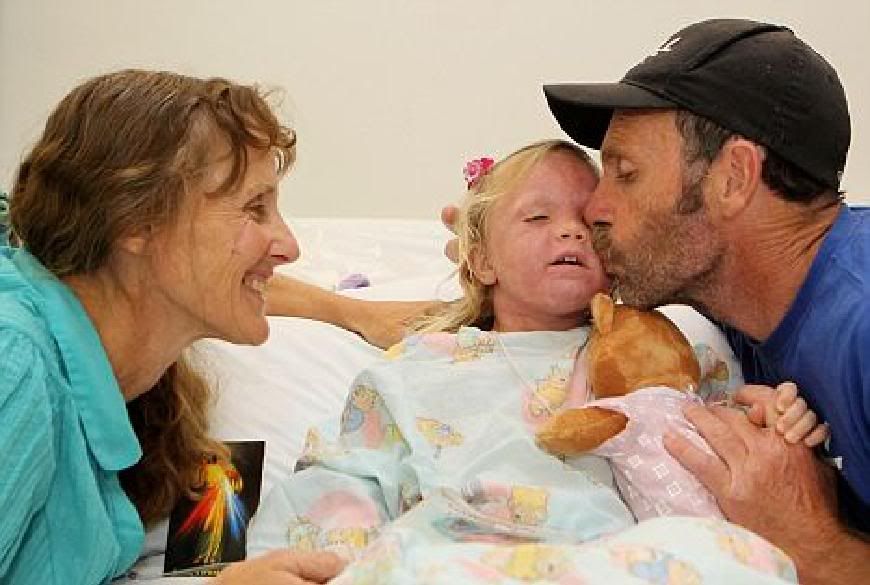
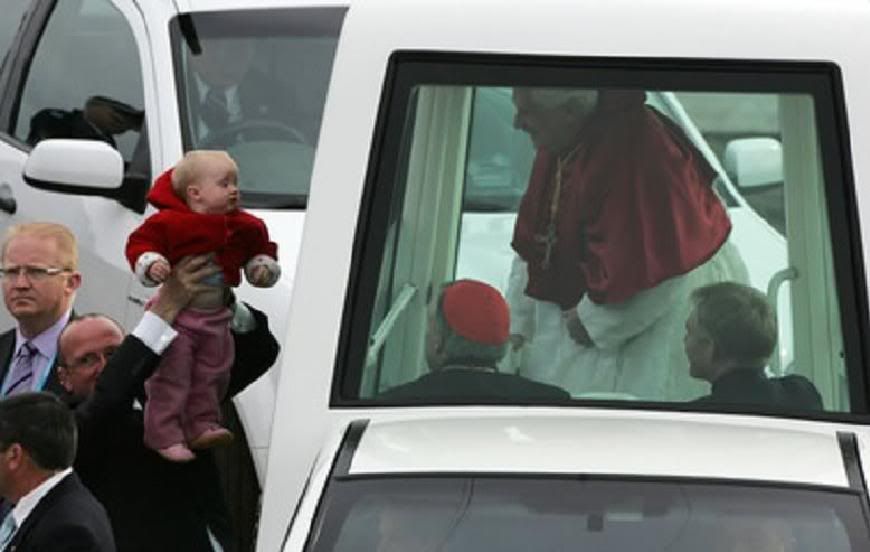
SYDNEY - The father of a three-year-old girl who was left almost without a scratch after being run over by a bus has accredited her miraculous escape to the power of God.
Peter Hill was convinced his daughter Claire - who was blessed by Pope Benedict XVI as a child - was dead when a 22-seater bus rolled on top of her in Australia's South Coast, pinning her to the ground.
But little Claire is set to be released from a Sydney hospital today after suffering little more than some minor cuts and bruises following Tuesday's accident involving the four-tonne vehicle.
Medical staff are at odds to explain how the youngster managed to survive without any major injuries or broken bones, but her father has put her escape down to divine intervention.
'I couldn't think anything other than a guardian angel was holding that bus up and keeping the weight off her,' Mr Hill told the Sydney Morning Herald.
The accident happened when Mr Hill accidentally rolled his bus while waiting in a queue for petrol at Woolworths service station in Nowra, landing on Claire, who had hopped out of the vehicle.
'At that moment I thought: "God, I've killed her,"' said Hill.
As Claire lay helplessly under the bus, her mother Sue, a strong believer in God, told her daughter to pray.
'I had put a miraculous medal [of the Virgin Mary] on her just an hour before,' said Mrs Hill.
The child was blessed by the Roman Catholic pontiff during his trip to Sydney in 2008.
Staff at Sydney Children's Hospital have confirmed that the young girl has no serious injuried and is expected to make a full recovery.
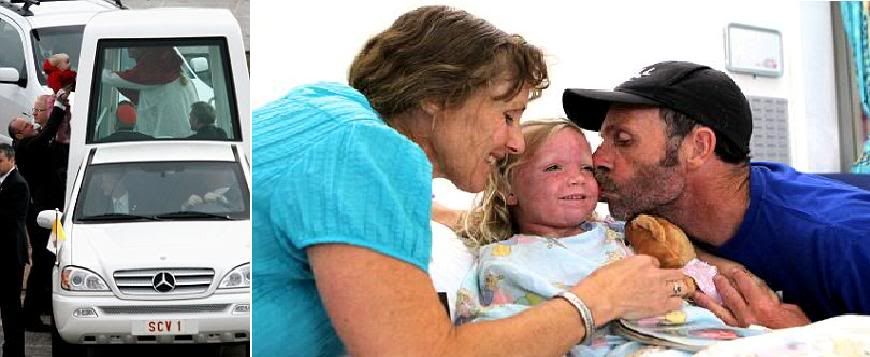
[Modificato da TERESA BENEDETTA 17/02/2012 16:02] |
| |
 19/02/2011 06:01 19/02/2011 06:01 |
|
| | | OFFLINE | | Post: 22.156
Post: 4.783 | Registrato il: 28/08/2005
Registrato il: 20/01/2009 | Administratore | Utente Master | |
|

 Pope to Philippine bishops:
Pope to Philippine bishops:
Keep God central in
the life of the faithful

Feb. 18, 2011
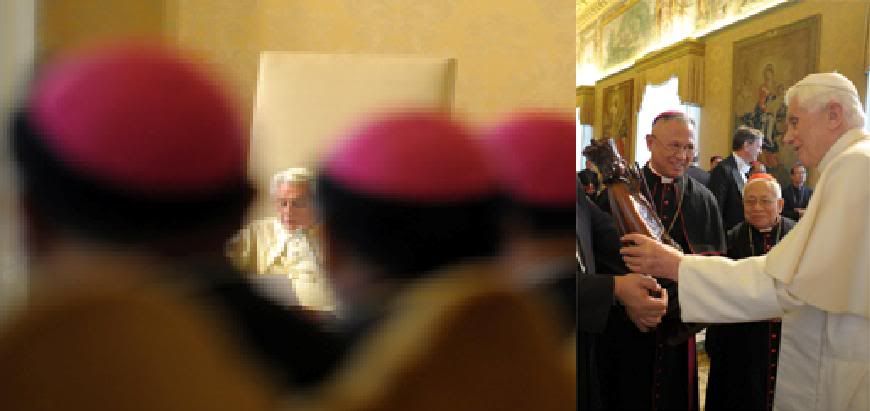
“Above all, keep God at the centre of life” of the Filipino people, Pope Benedict XVI told bishops Friday morning as he received the second batch of Church leaders from Asia’a most populous Catholic nation.
Led by Archbishop Palma of Cebu, the bishops were eager to hear the Pope’s words, as they look for inspiration to “face the many concerns that confront us in the Church”.
Here is the full text of the Holy Father's address, delivered in English:
My dear Brother Bishops,
I am pleased to receive you today on the occasion of your ad Limina visit, and I offer my sincere good wishes and prayers for yourselves and for all those entrusted to your pastoral care.
Your presence at the tombs of the Apostles Peter and Paul strengthens the profound unity that already exists between the Church in the Philippines and the Holy See.
As the deep links which Catholics enjoy with the Successor of Peter have always been a significant characteristic of faith in your country, I pray that this communion will continue to grow and flourish as you consider the present challenges of your apostolate.
While the Philippines continues to face many challenges in the area of economic development, we must recognize that these obstacles to a life of happiness and fulfilment are not the only stumbling blocks that must be addressed by the Church.
Filipino culture is also confronted with the more subtle questions inherent to the secularism, materialism, and consumerism of our times.
When self-sufficiency and freedom are severed from their dependence upon and completion in God, the human person creates for himself a false destiny and loses sight of the eternal joy for which he has been made. The path to rediscovering humanity’s true destiny can only be found in the re-establishment of the priority of God in the heart and mind of every person.
Above all, to keep God at the center of the life of the faithful, the preaching of you and your clergy must be personal in its focus so that each Catholic will grasp in his or her innermost depths the life-transforming fact that God exists, that he loves us, and that in Christ he answers the deepest questions of our lives.
Your great task in evangelization is therefore to propose a personal relationship with Christ as key to complete fulfilment. In this context, the second Plenary Council of the Philippines continues to have beneficial effects, the result being that many dioceses have formed pastoral programs focused on conveying the good news of salvation.
At the same time, it must be recognized that new initiatives in evangelization will only be fruitful if, by the grace of God, those proposing them are people who truly believe and live the message of the Gospel themselves.
This is surely one of the reasons why basic ecclesial communities have had such a positive impact throughout the country. When formed and guided by people whose motivating force is the love of Christ, these communities have proven themselves to be worthy tools of evangelization as they work in conjunction with local parishes.
Similarly, the Church in the Philippines is fortunate to have a number of lay organizations which continue to draw people to the Lord. In order to confront the questions of our times, the laity need to hear the Gospel message in its fullness, to understand its implications for their personal lives and for society in general, and thus be constantly converted to the Lord.
I therefore urge you to take special care in shepherding such groups, so that the primacy of God may remain in the forefront.
This primacy is of particular importance when it comes to the evangelization of youth. I am happy to note that, in your country, the faith plays a very important role in the lives of many young people, a fact that is due in large part to the patient work of the local Church to reach out to the youth at all levels.
I encourage you to continue to remind young people that the glamour of this world will not satisfy their natural desire for happiness. Only true friendship with God will break the bonds of loneliness from which our fragile humanity suffers and will establish a true and lasting communion with others, a spiritual bond that will readily prompt within us the wish to serve the needs of those we love in Christ.
Care must also be given to showing young people the importance of the sacraments as instruments of God's grace and assistance. This is particularly true of the sacrament of matrimony, which sanctifies married life from its very beginning, so that God's presence may sustain young couples in their struggles.
The pastoral care of young people which aims to establish the primacy of God in their hearts, tends inherently to result not only in vocations to Christian marriage but also in plentiful callings of all kinds.
I am pleased to note the success of local initiatives in fostering numerous vocations to the priesthood and the religious life. However, the need for ever more dedicated servants of Christ both at home and abroad is still pressing.
From your quinquennial reports, it appears that in many dioceses the number of priests and the corresponding number of parishes is not yet sufficient to meet the spiritual needs of the large and growing Catholic population.
With you, I therefore pray that young Filipinos who feel called to the priesthood and the religious life will respond generously to the promptings of the Spirit.
May the Church’s mission of evangelization be sustained by the wonderful gifts which the Lord offers to those whom he calls! In your turn, as Pastors you will wish to offer these young vocations a well-developed and carefully applied plan of integral formation so that their initial inclination towards a life of service to Christ and his faithful may come to full spiritual and human maturity.
Dear brothers in the episcopate, with these thoughts I assure you of my prayers and commend you to the intercession of Saint Lorenzo Ruiz. May his example of steadfast faithfulness to Christ be an encouragement to you in your apostolic labors.
To you, to the clergy and religious, and to all the faithful entrusted to your care, I cordially impart my Apostolic Blessing as a pledge of grace and peace.
[Modificato da TERESA BENEDETTA 19/02/2011 20:43] |
| |
|
|
|
|